#I’m aware that this is a character flaw but tragically it runs in my family
Explore tagged Tumblr posts
Note
with the heavy caveat that it is slightly soulless (though really most corporate jobs are) - amazon corporate pretty much has what you’re describing. i’ve been with them about 3 years and right now i’m working hybrid out of one of the corp offices, M-F 8 hr shifts, 2 days in office and 3 days at home, with the ability to come in more as wanted or needed. Depending on the team or role you still have to talk to people but because it’s all regional it’s over slack/email, never really face to face or over phone, and with a lot of free time for personal projects (or slacking off). on slower days i’ll usually bring my knitting to work and stick on an audiobook which is pretty common. def not perfect but it fits the bill for what i need (e.g. ‘leave me alone with my spreadsheets and music and i’ll get back to you when my project’s done’)
oh interesting! that definitely does sound like the kind of structure I want, although I have to say that I have also found that I need to at least somewhat agree with the mission of my workplace to really get along. not saying this to shame you because yeah all corporate jobs are pretty much equally soulless, just that I definitely had a better time working at a library and a museum than I’m having working for a university, which is ostensibly something I agree with principles-wise but is actually hugely corporatized/tied up in bureaucratic bullshit. but I will keep this in mind bc I also like to get paid a living wage and libraries and museums aren’t known for that lmao
#and by “better time” I mean able to complete my work without it taking a colossal effort to give a shit#I’m aware that this is a character flaw but tragically it runs in my family
0 notes
Text
The Voyage So Far: Paramount War (Part Two)
east blue (1 | 2) || alabasta (1 | 2) || skypiea || water 7 || enies lobby || thriller bark || paramount war (1 | 2) || fishman island || punk hazard || dressrosa (1 | 2) || whole cake island || wano (1 | 2)
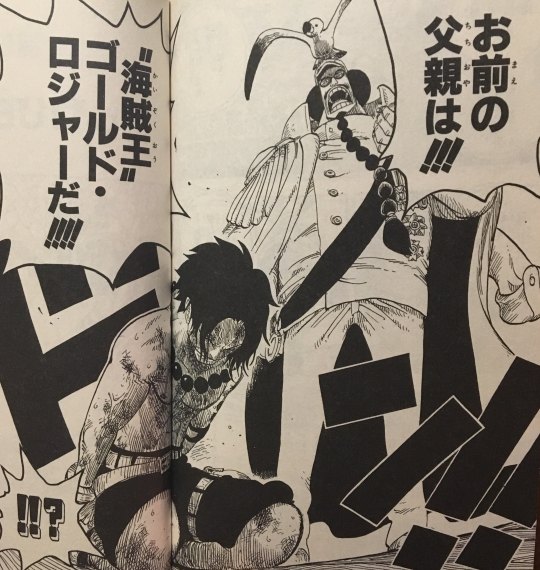
ace’s execution is, in a way, the exception that proves the rule when it comes to one piece’s themes of blood and family. ace is set up to die for the crimes of a father he never knew and never wanted, and he does die here, but in the end he dies for the family he did choose, in the form of luffy, rather than the one he didn’t.
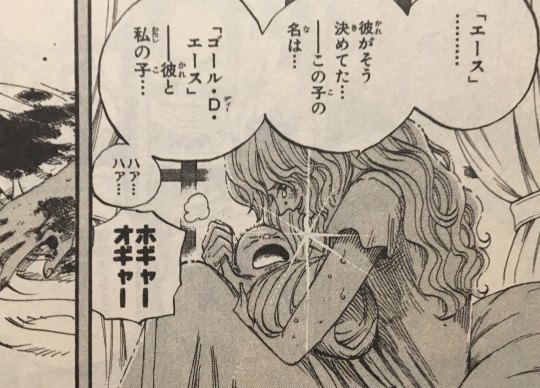
god do i wish we knew more about ms portgas d. rouge. with ace’s storyline pretty much wrapped it looks unlikely that we’re going to be learning more about her than what we got, which in my opinion is an absolute tragedy, because what little we do know about her is amazing and she’s an absolute badass. oda give us more female ds please.
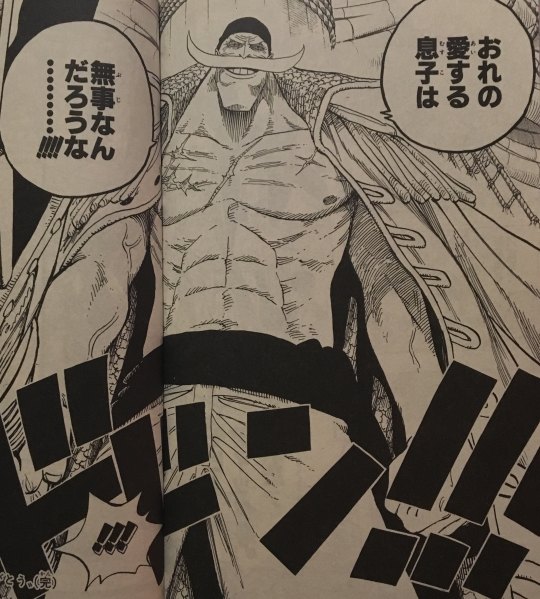
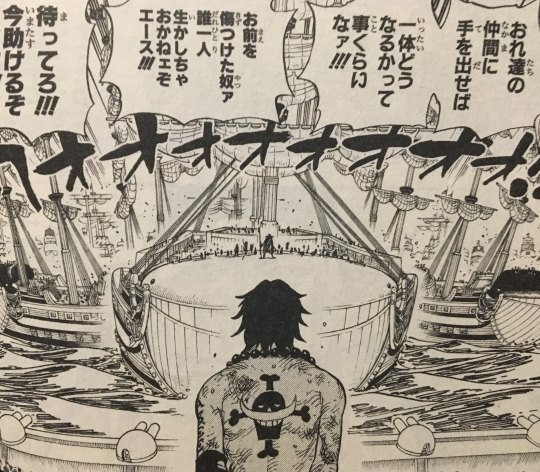
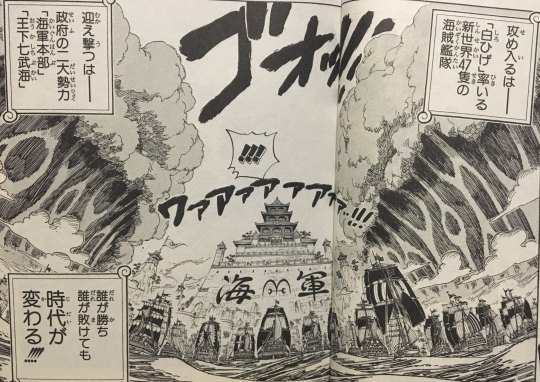
whitebeard’s power is so cool. it might be one of the visually coolest devil fruits we’ve ever seen, in my opinion. he he causes earthquakes and tsunamis while far past his prime; he pulls the sky apart with his bare hands. this whole arc is world-shaking, and whitebeard’s power is perfectly appropriate for it.
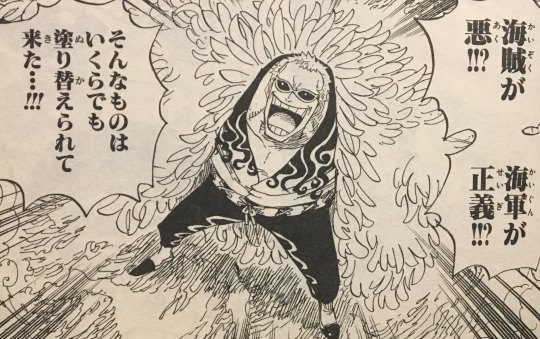
doflamingo’s speech on justice and rightness is one of the most well-remembered quotes from this whole saga, and rightly so. i’ve always found it fascinating, myself, because he’s right. he dead-on hits how the one piece world works- the world government and the marines rule the world not because of any inherent actual goodness or justice or right, but because they won a war a very long time ago.
in a way, this reminds me of blackbeard’s line of “people’s dreams never die” from jaya. i like how oda isn’t afraid of letting his villains be right about the themes of the story, sometimes even having better awareness of them than the protagonists.
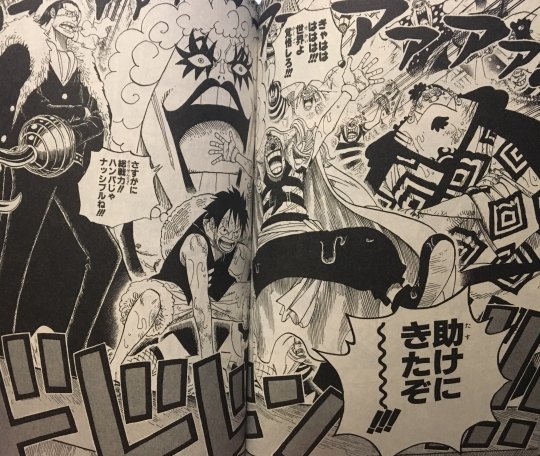
man, if i had to pick a single favorite spread out of the whole manga, it might be luffy’s marineford entrance. it’s so epic, and so completely unexpected for everyone else there. absolutely nobody was expecting strawhat luffy to drop out of the sky with a posse including two former warlords. it just makes me grin!! so much!!
it also gets followed up by a solid two pages of just people’s reactions, from smoker’s “what the HELL is he doing with CROCODILE” to moria’s immediate incoherent rage, and i just love that the world and cast of one piece is so well-established and built up that we know exactly how all of those people know luffy and why they react the way they do.
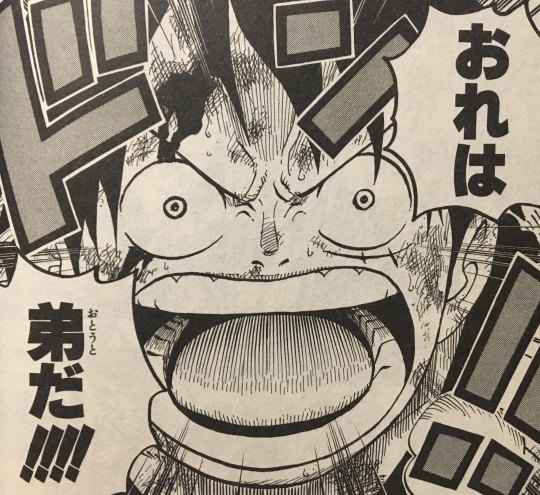
going back to what i mentioned in the last post about marineford being luffy’s conflict of interest arc, i’d say it’s also the only time where he isn’t the future king first and foremost. in this arc, before anything else, he’s a little brother.
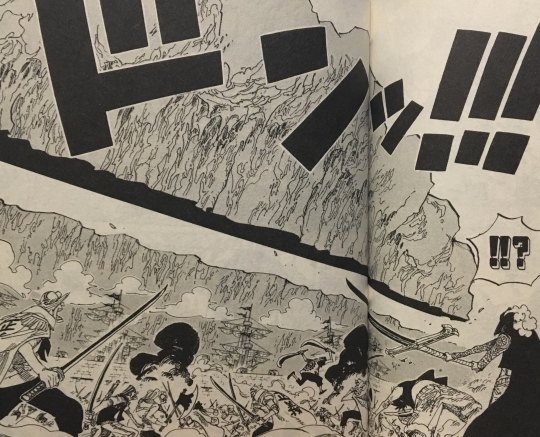
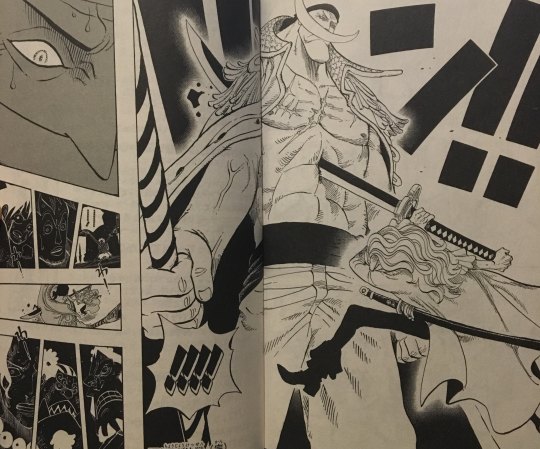
there are a lot of what-if moments in marineford. moments where you kind of have to ask “what if this specific thing hadn’t happened, had gone differently?” would things have turned out differently? squard’s betrayal is one of them. does this change the outcome? would whitebeard have been able to survive if not for this injury? there’s no way to know. marineford is a lot of little tragedies, and they just pile up and up.
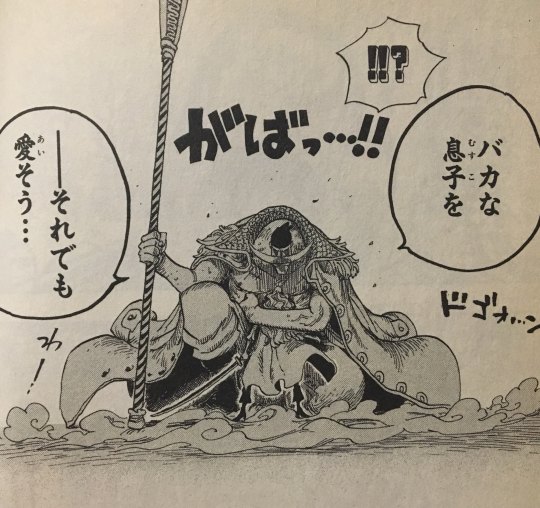
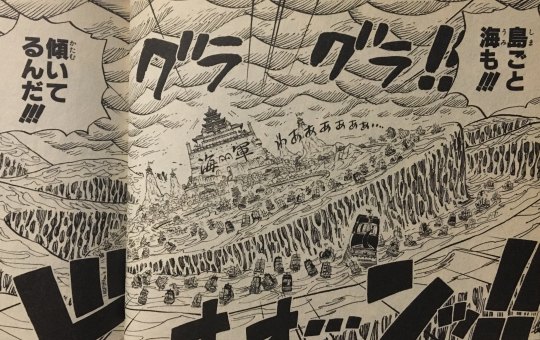
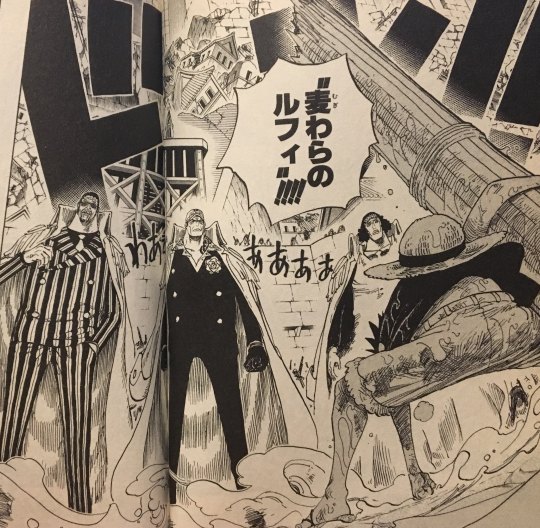
marineford has just so many incredibly striking spreads. all of the momentous moments (and there’s a lot of them, in this arc) are done full justice. this is such an image heavy post just because marineford is such an incredibly visually strong arc.
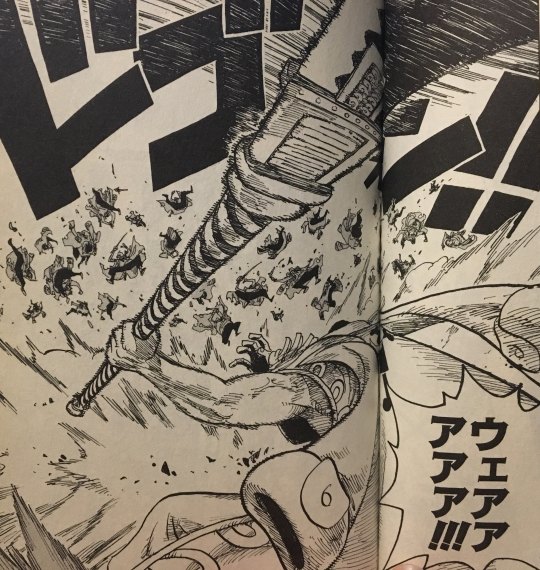
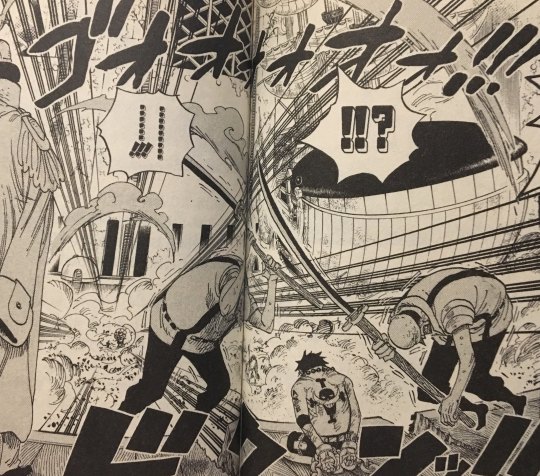
conqueror’s haki is so cool and i love the way it’s set up and built up throughout this saga, with luffy’s constant inadvertent uses of it, from duval’s bull to marigold and sandersonia to the wolves in impel down, all leading up to this moment.
i’ve heard people complain about conqueror’s as kind of a deus ex machina, but i honestly love it, it’s very cool and honestly i think it just seems to fit luffy as a power. if there was ever gonna be a character who turned willpower into a weapon, it would be monkey d. luffy.
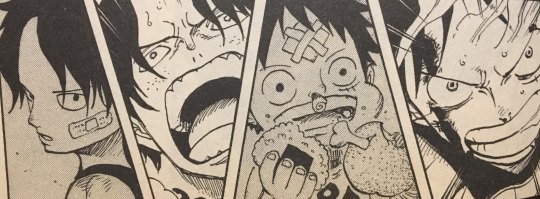
i’m gonna take this chance to talk about garp, because this sequence of panels is heavily implied to be garp’s thoughts just before luffy punches him down, and it hurts. garp is a flawed person who makes some bad choices, and there’s no arguing that, but i think it’s very obvious he really, really cares about his grandsons, even if he never could understand them as people and that they never would have been happy as marines. and that’s just tragic, really.
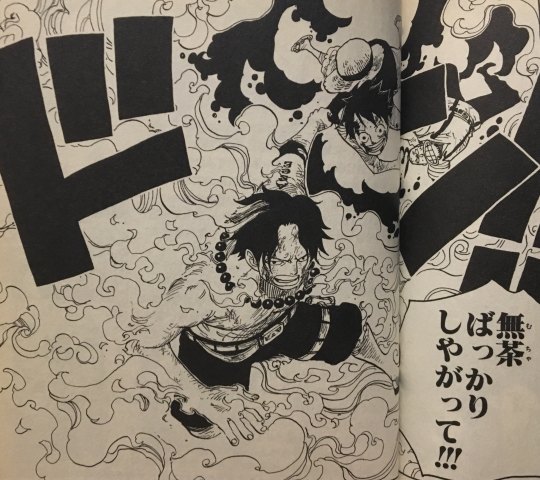
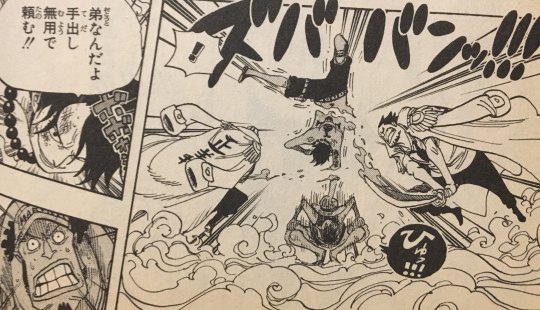
the moment ace gets freed and the brief span of time where he and luffy can fight together feel so triumphant, and i think it’s one of the reasons the final tragedy of marineford hits so hard and feels so cruel, because luffy succeeds, here. he saves ace. he gives absolutely everything he had and makes it, and saves ace. the ultimate failure isn’t his. there was nothing more he could have done.
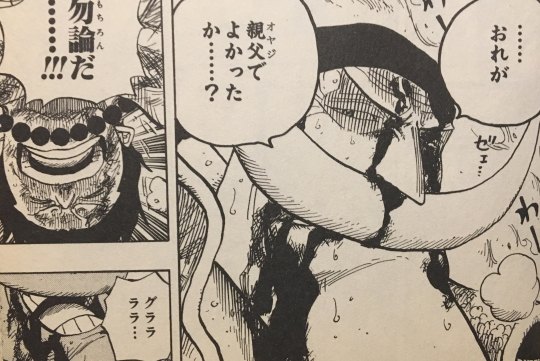
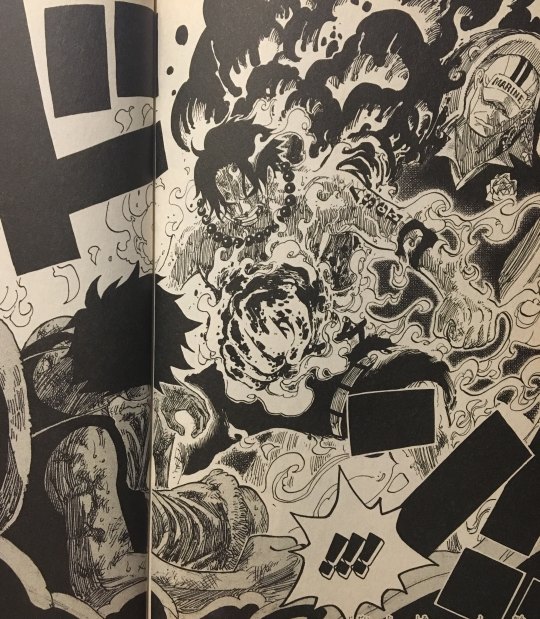
the first time i was reading one piece, i hit this page (which is also the last in the volume) and had to put the book away, take the bus downtown, wander around for a few hours, and buy myself some candy and some new books before i started feeling okay again.
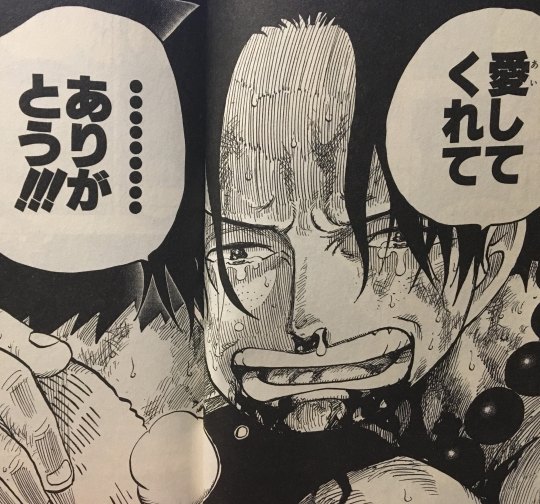
the thing about ace’s death, i think, is that it’s a tragedy, but it also feels so completely essential to the story going forwards and luffy’s character growth specifically that it’s really, really hard to imagine one piece without it. there are a lot of (really excellent!) fix-fics out there for marineford, and although those are often really good and their authors super talented, i think it’s really hard for them to ever hit the same way canon does with regards to this.
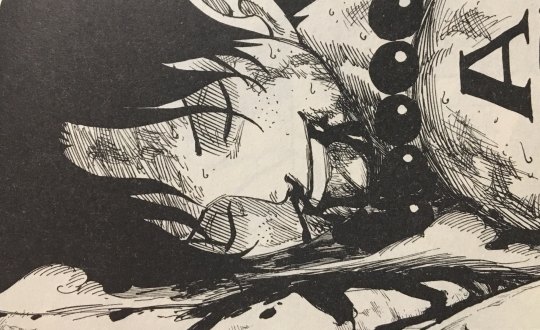
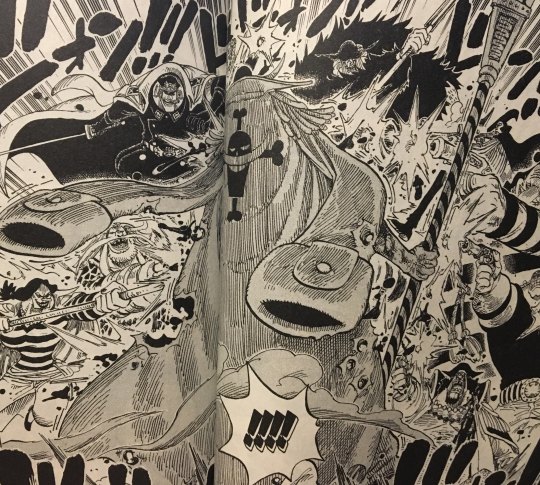
i always think of this scene specifically in contrast to zoro and mihawk’s fight, back on baratie. zoro and mihawk are both people who believe in honor in battle, true victory or death, and that’s reflected in their fight, in zoro’s refusal to turn and run even in the face of imminent death, and mihawk’s respect for that resolve. whitebeard, too, is an honorable man. he refuses to turn to run, even when facing certain death.
the blackbeard pirates, however, are not.

i do enjoy how, just like roger’s, ace’s execution backfires tremendously on the marines. this was entirely a predictable outcome, too! this exact thing happened twenty years ago! the marines don’t learn. they don’t change. they’re so assured of their own rightness and power that they make stupid mistakes like holding a massive public execution after the last one blew up in their faces.
(this is why they need coby so badly, for the record, and why it’s important that he still decides to become a marine after witnessing their corruption firsthand in shells town. the marines are long overdue for a reformation, one that orients them towards real justice.)
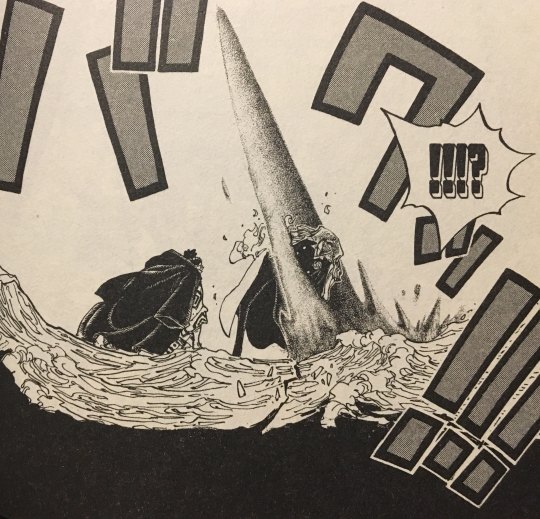
i really, really enjoy crocodile in this saga. mostly because he hasn’t been redeemed at all, he’s still pretty much the exact same kinda awful person he was in alabasta, he’s just on luffy’s side this time, and it lets us see him in a better light, when he gets angry at whitebeard for nearly dying or when he helps luffy and jinbe escape to keep the marines from getting their way. few of one piece’s characters are truly so one-dimensional as they can seem, and i really appreciate that.
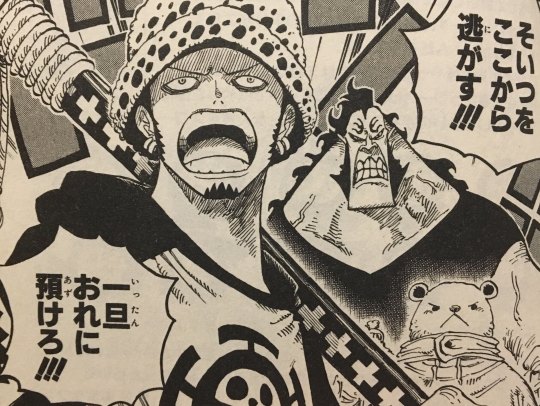
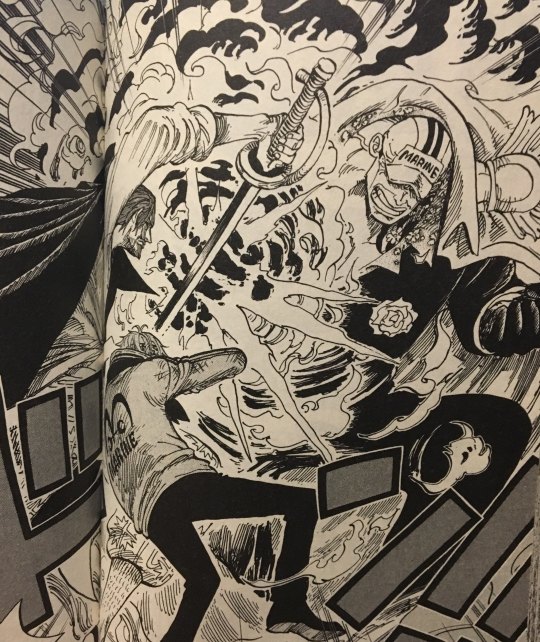
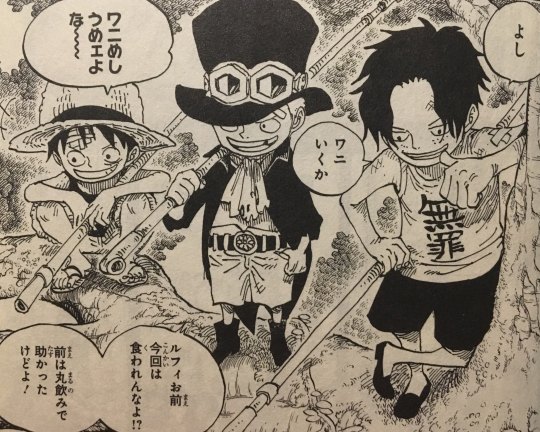
i really really love all the interactions between luffy, ace and sabo as kids. they’re so fun and bounce off of each other so well. even though we only see them together for a brief time, they really feel like siblings. (which of course only makes later events hurt so much more.

i’ve always been a little fascinated by the fact that it takes us this long to get luffy’s full backstory. it’s almost a fakeout, because we get part of his backstory in the very first chapter, and we’re kind of led to believe that’s all there is. it’s not until ace’s introduction nearly two hundred chapters in that we’re given any indication there’s more.
but at the same time, it makes sense. marineford is luffy’s focus arc, as arlong park to nami or thriller bark to brook. he hasn’t had a focal arc that’s really about him before this, while all his other crewmates have. it makes sense that this would be when he finally gets his flashback.
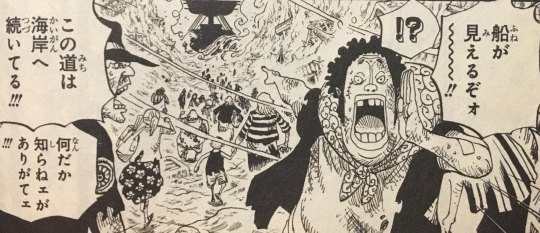
i think it’s cool that dragon and the revolutionaries show up at the grey terminal fire, because it’s one of the only looks we’ve gotten so far into what their actual regular operations are like. and, of course, they’re saving people. i really like this about the revolutionaries, that helping people in trouble is basically their modus operandi, when pretty much everyone else in one piece’s world mostly does saving on an incidental basis if at all.
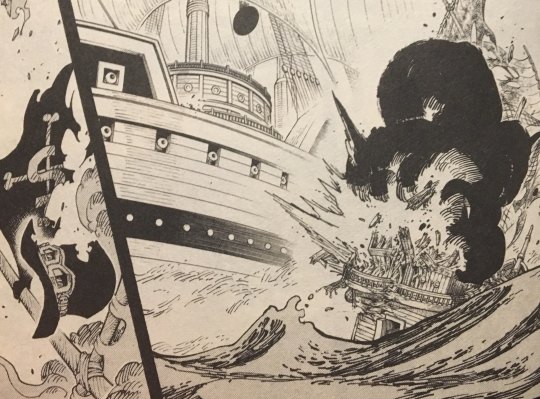
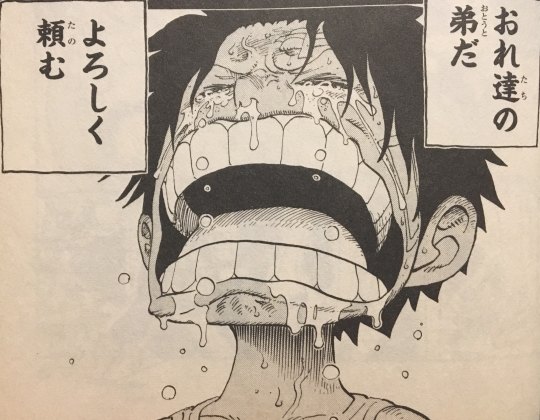
i think a lot about how the last line of sabo’s letter to ace is also both of their last words to the strawhats.
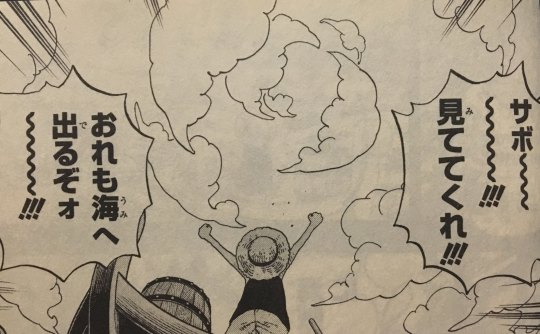
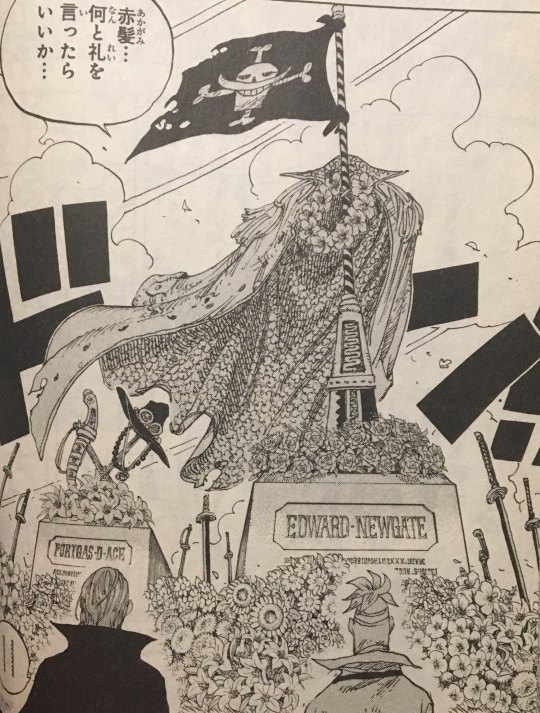
death in one piece always feels much realer and more impactful to me than in most other series, and i think this is part of the reason why: in one piece, we are always shown the mourning. nami at bellemere’s grave, carrot grieving pedro, ace and whitebeard’s funeral.
there are fewer deaths, comparatively, than most other series, but they’re given so much room to echo. we’re still feeling the impacts of ace’s life and death in the most recent chapters of wano. it ties into the theme of inherited will and all the way back to hiriluk’s final speech, of men not being dead so long as they’re remembered.
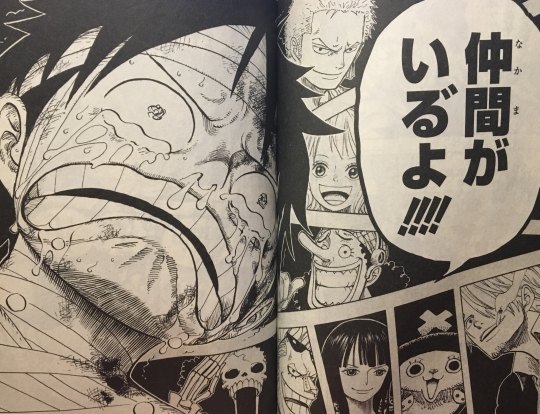
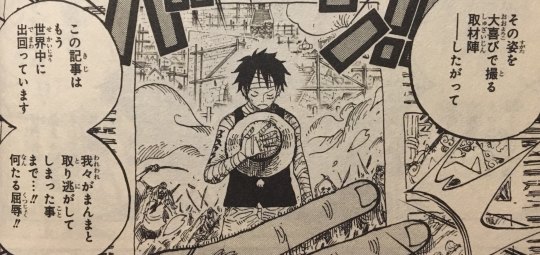
the picture of luffy at marineford always kind of strikes me. he looks so young and so solemn, and yet much more himself than he did when we last saw him losing his mind on amazon lily. i really like it.
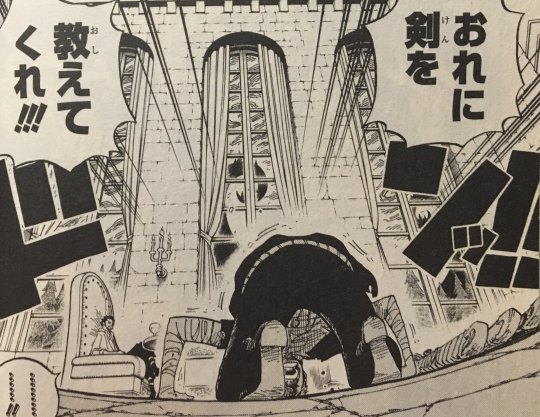
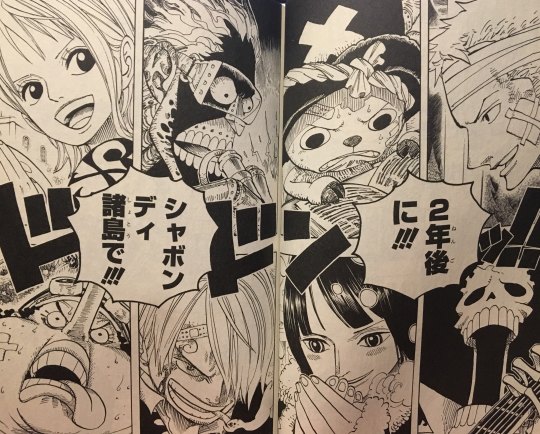
sometimes i just think about the sheer depth of trust and love the strawhats must have in each other to separate for two years, far longer than they were ever together, to solely dedicate themselves to improving for the sake of crew and captain. none of them even hesitate, and none of them ever doubt that the crew will be reformed at the end of it.
after all, luffy keeps his promises.
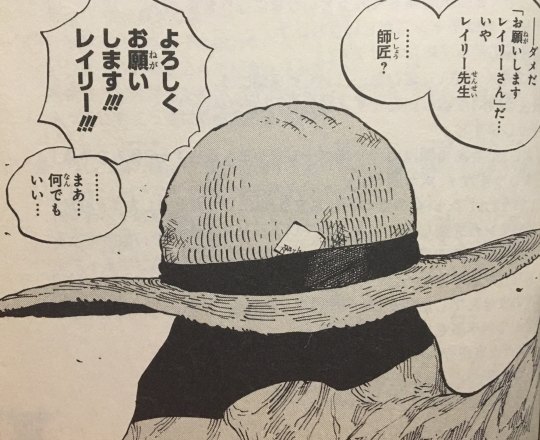
261 notes
·
View notes
Text
Todosibs (and other BNHA) rec list
I started another BNHA fic reclist and it got long so I'm putting it here as I tend to.... on my ATLA sideblog. Don't worry about the logic of this too much, haha. Anyways, a lot of these are pretty well known, but maybe some are new to you! I'm also giving pitches for why I like them geared towards specific requests, and I'll list the original request at the bottom of the post so if you guys have further recs that meet these requirements let me know!
Not all who wander are lost -- https://archiveofourown.org/works/17950646 -- 27k words, complete -- Has probably been rec’d here before, and I was re-reading it today as a treat, I still love it a lot! All four Todoroki siblings run away together after Rei burns Shouto. I love the characterization, and how the author draws on their own experience as a foreigner working in Japan, and how they did their research on missing child cases and child homelessness in Japan (it doesn't go hugely in depth but I appreciate the authors' notes discussing this, even if it's, well, incredibly tragic. There’s more light hearted cultural notes as well!)
make this feel like home -- https://archiveofourown.org/works/21852745 -- 27k words, complete -- we already rec'd this to you but adding it here for completion. A character-focused Todosibs fic with EXCELLENT portrayal of sibling relationships. I re-read this one A LOT.
Dragon Head, Snake Tail -- https://archiveofourown.org/works/17195510 -- 61k words, incomplete -- Another Todosib favorite that deals with canon and also an AU in which Rei got a divorce and everyone mostly grew up away from Endeavor. I love how the sibling relationships are depicted, but I also love how the author is a huge kanji nerd who fully lean's into Horikoshi's love for punny names and the long authors notes explaining how they came up with every new name in the fic. It's occasionally bittersweet but mostly a fun & humorous fic.
Twin Swap -- https://archiveofourown.org/series/1867879 -- 55k words, on hiatus with 2 complete arcs -- do you want Todosibs AND great villain characterization? (well mostly Fuyumi & Touya, but Natsuo is there for a bit too). Anyways the fic is mostly pretty lighthearted in tone, but it's also not afraid to hit hard in the characterization department, and I really love how this author wrote all of the League members. I re-read this one a lot.
No Such Thing As a Hopeless Case -- https://archiveofourown.org/works/16806328 -- 14k words, hiatus (and right on a cliffhanger too!) -- All Might accidentally kinda adopts the league of villains? Again, great LOV characterization, and I think you'll like how it explores the societal factors and personal tragedies that lead them to and keep them at the margins of society. also, some really terrible puns, which are my favorite thing
could i but teach the hundreth part -- https://archiveofourown.org/works/12558048 -- 5k words, complete -- a post-canon outsider-POV fic of Class 1-A visiting and taking care of a retried All Might. It’s just short and sweet.
Missing Everything -- https://archiveofourown.org/works/30128547 -- 52k words, in progress -- AU where Izuku doesn't learn of All Might's secret during the slime attack, but manages to befriend him through his civilian identity. Recommending this for the really interesting (to me at least) characterization of All Might and examination of his flaws and the toll of his career, and recently it's gotten into some interesting exploration of the details of the Hero System with the beach clean up.
Q.A.B. -- https://archiveofourown.org/works/27665101 -- 18k words, complete (w/ a sequel just starting out!) -- a really excellent social media fic in which Izuku stays quirkless and doesn't go to UA but does gain a following online for his quirk analysis and hero blogging. Also features great characterization of Todoroki, Kaminari, and some of the Vigilantes crew.
Yesterday Upon the Stair -- https://archiveofourown.org/works/8337607 -- 460k words, complete. You're probably aware of this fic since it's the highest hit count in the fandom, but I really think it fits your requirement and writing and character work! I know some other people who think the writing and character work are mediocre though, which I'm baffled by... but YMMV? The beginning is weaker and my absolute FAVORITE part is the Nighteye arc, which is the last 20% of the fic, but I would say it really starts to hit its stride by chapter 9~10? If you aren't enjoying it by then it's probably fair to expect it won't catch your interest later.
I can't believe no one has written any "self insert as Bakugo" fanfics... - https://archiveofourown.org/works/17662220 -- 70k words, infrequent updates -- I like this one for taking a weird as hell premise and REALLY rolling with it. It's somehow pretty similar to a lot of more positive takes on Bakugo's relationship with the Midoriyas while also being very much it's own thing. The author is NOT "far out of high school" though -- it's hilariously clear from the SI's reactions to certain quirks that the writer started this while taking lower division universtiy physics (and personally I love that). Also appreciate SI!Bakugo's war with Nedzu to get proper counseling and mental health support for class 1-a after all the shit they've been through.
It's Over, Isn't It (it's only yet begun) -- https://archiveofourown.org/series/1269638 -- 66k words, abandoned series with several complete stories -- AU where All Might dies rescuing Tenko from AfO but other than that it's a heartwarming fix-it! Same author as YUTS, very positive portrayal of Nighteye, excellent character writing for many other characters.
Subject: A Comprehensive Report -- https://archiveofourown.org/works/16037609 -- 83k words, infrequent updates -- another very popular fandom staple, but hey it's really good! A social media fic with quirkless Izuku interning with Nighteye as an analyst. Has some very interesting exploration of the legalities of Hero Society and how the status quo developed.
For Fools and Utopias -- https://archiveofourown.org/works/22547254 -- 89k words, updates regularly -- okay grace is the one who rec’d this fic to ME but to anyone stumbling across this reclist on tumblr, THIS FIC IS A MUST READ. Absolutely the BEST, more thought out and gutting portrayal of the flaws of the hero system, and how the different characters struggle with it. This fic GOT to me, hard, I’m still thinking about it a lot. Takes place roughly a decade post-canon, in an AU where Izuku never met All Might or went to UA, and nothing got fixed (yet! they’re trying!!). Features absoulely STELLAR characterization of Midoriya, Shinsou, Todoroki, his sibblings, Ragdoll, and more!!
Here’s the original request:
any of the following in any combination: - really good writing - sophisticated character work - engagements with the ethics of the hero system - some kind of actually nuanced take on the Todoroki family - anything obviously written by people who are long out of high school (sorry for being old) - adults todobaku - good looks at the villains because guess what I continue to be weak for villain stories - basically anything that's Really Good - I like grey areas
(to clarify, I, teashoptiramisu, am not the originator of this request but I’m also interesting in reading more fic exploring these ideas, so if you have any more fic that you think meet it feel free to drop the link(s) in a reblog or send me an ask!)
38 notes
·
View notes
Text
Honestly, I haven’t been chatting enough about Owl House Season 2, so I’m gonna make some bullet points here about what I’ve been loving from these first five episodes.
-Lilith & Hooty’s whole friendship dynamic. It’s very nice, ironic, funny, and super cute to see two polar opposites become the most unlikely of friends. Also, it adds a nice change of pace to a side character, like Hooty, who was the guy no one liked to hang around with much as a running gag in Season 1. Now Hooty has someone who enjoys his company and values much of what he has to say, too. Lilith knows what it’s like to not have people enjoy their company, as she made choices that winded up putting her in a place of solitude from actual healthy socializing. For a long time Lilith didn’t have anyone to genuinely consult, until this silly freaking Owl tube came along to give a sense of safety after abandoning her ideals that defined this Witch for a couple of decades.
-Getting me to actually care more about King’s role in this story line. King wasn’t someone who really clicked with me in Season 1′s run time. I liked his episodes centering on the sibling dynamic he had with Luz sure, but not any one of them made me go, “This character is actually very endearing and want to see more of their journey.” , where I took King more as an overall decent member of the cast at best. Echoes of the Past seriously surprised me in how well it executed his backstory showcasing the strong connection he has to Edalyn & Luz in general as a found family. The revelation of how Eda & King met, on top of her dubbing him with that name this little guy cherishes, paints a picture of how much Eda truly cares about the young demon. Edalyn wanted him to feel good about his place in their world, which only ended up being a mistake she’d have to correct afterwards in this episode. Echoes of the Past was such a lovely surprise in how well it succeeded in building upon the lore of this interesting world and giving King’s development more of a dramatic and tragic revelation of characterization. I’d arguably say what they did with King’s may be the best part for me in Season 2, thus far. It really was that much of a shock for me in what they accomplished.
-Amity & Luz, my God where do I even begin with these two cute love birds? If Grom Night was the story’s way of acknowledging Amity has got a crush on Luz, then this episode lit a spark underneath our main heroine’s interest in her romantically. When Amity charged in against her parent’s improved abomination saying like a badass, “Get away from my Luz!”, anyone could see how mesmerized Luz looked at her actions. Part of me thought they’d continue doing the unaware protagonist trope, where Luz wasn’t aware of Amity’s feelings or even gains a crush of her own, either. Really enjoying how Dana Terrace and her crew have been approaching this representation of LGBTQ through making the whole concept of Lumity romance feel super organic from both ends. It’s no longer a one sided deal with only Amity having feelings for someone, who helped make her once miserable life so much greater. Luz now views her in the same inspiring light Amity did in Grom Night’s story of seeing this person as more than a friend, but a significant individual she wants to share her life and world with back on Earth. This is how you do a romantic representation without beating viewers over the head of how much you’re pushing boundaries. Let the characters actions speak on how they feel about each other.
-Gwendolyn’s introduction the story was a very welcoming one, as it gave more of a complicated shake up to how interesting, yet tragic, Edalyn & Lilith’s lives are when it comes to their relationship with their respective parent. Lilith choosing to curse Eda already put many years of guilt upon herself, but to not get any attention afterward from her mother’s top priority becoming curing her sister’s curse instead? Talk about another way to look it as Lilith feeling more down in the dumps for putting that curse on Eda. Lilith likely felt as if she didn’t deserve to be loved after throwing her sibling under the bus to get into the Emperor’s Coven, which led to a long struggle of trying to makes amends. Bringing their mother into Season 2 was a terrific way to shed more light onto how this crazy family operates and show just how much the curse affected them all emotionally on different levels. Eda had to distance herself from others, Lilith searched to find answers on her own, and Gwendolyn poured so much of her life into wanting to help her youngest child, at the expense of forgetting about Lilith’s needs. A great representation of a flawed, yet still loving, family tree.
-Showing Gus’ magical illusion abilities in a seriously cool, albeit disturbing manner, of how even if he may be limited to using just one type of magic doesn’t mean it’s not powerful. How they went about evolving the strength of illusions being used to even physically fool people into feeling the touch of it, while showing a greater strain on its user casting said spell, adds a new level of awesome to Gus’ abilities. It shows he can become a great asset to his friends in the future of growing events and not just get sidelined unfairly, due to a growing power scale of some kind. That was another one of my favorite parts of the episode, beside that whole deal many are talking about surrounding Lumity’s very great growth in Through The Looking Glass Ruins. Give it up for the future MVP Gus over here, as I can see this stuff coming into play against the Emperor’s Coven conflict possibly in Season 2′s finale when shit gets very real.
#the owl house season 2#i haven't been doing enough gushing about its second season#imma make up for that#toh spoilers#through the looking glass ruins#lumity#amity blight#luz noceda#toh season 2 spoilers#lilith clawthorne#edalyn clawthorne#gwendolyn clawthorne#the owl house#seriously to anyone who hasn't checked it out yet watch this series now#it's getting really damn good up in here y'all
37 notes
·
View notes
Text
Harrow the Ninth: Blood and Guts; With Feeling!!!
While I’m sure the physical trauma, gore, intentional autophagia, unintentional cannibalism, and necrophilia in the book will be what turns mainstream heads, what really grabbed me about Harrow the Ninth was its unabashed and sincere humanity.
Every character in Harrow the Ninth gets to be a full human being. The best example to my mind is Crux: a gruesome cadaver 2 parts loyalty, 3 parts shouting, and 5 parts sheer bloody-minded cussedness; who blew up a long-grieving, broken family(and their completely innocent pilot) for the “crime” of leaving the place that murdered their husband and father and broke them; who insulted, beat, and tortured Gideon her WHOLE DAMN LIFE. And, also, the major, if not only, source of kindness and sympathy in Harrow’s own.
CRUX!!! Kind uncle Crux sneaking her sweets once a year and whenever she gets sick? Reliable retainer Crux always honest with her about her hallucinations and never judging or dismissing her for them; doing EVERY BIT of what little he can to help and protect her? Soft-voiced and kind Crux being the only member of the household who DOESNT abandon her in the Nova AU? THIS IS HOW HARROW SEES CRUX! The guy who casually kicked and spit on Gideon, who treated her as less than trash and never showed her even the shadow of an ounce of kindness is, in Harrow’s mind, the kindest person in her life. That is Fucking Wild.
Everyone is allowed to be 3D in this book, even when Harrow and Gideon disdain them. Ortus -a too-big blubbering joke in Gideon the Ninth, and Gideon and Harrow’s minds both- doesn’t JUST get to be brave, to be selfless, to confront and face up to and SURMOUNT his mistakes and flaws and then ride off glorious and stupid into Valhalla, he gets something so much more important; to speak for himself. To be Known. Understood. Through Harrow’s petty sniping we get to see the love and care he has for his shitty poetry; through her defensively projected self-loathing his regret, his sympathy, the breadth of his Heart, the loyalty to Harrow which lets him be insulted and also the stubborn pride which insists those insults not go unanswered. I’m tearing up just writing this! We get to see, in his meeting Protesilaus, him struggle with the very image of EVERYTHING he wants to be but isn’t, AND we get to see him resolve that displaced self-hatred to BOTH men -who he is, and who he isn’t- and befriend them both, and realize that the physical distance between them is superficial before the siblinghood of souls, and even more: that the conceptual distance between his ideal and his reality doesn’t have to prevent him from being good. He’s still a side character but he gets an arc, development, a story, and resolution, and HE gets to give its summation. And he’s allowed to be Heroic in his own way! HIS words summon his Hero from The River to speak HIS meter while fighting to save them all powered by THEIR shared belief in HIS Art, and then a heaven of his own defining. What other book does that for a JOKE character?!
And again: this is everybody. Yes of course the souls Harrow unknowingly called up, all those too-soon dead from Gideon the Ninth; We get to see Abigail and Magnus’s love for one another -and the dreadful teens, and their universal big-heartedness- up close, and the refutation of(or perhaps counterpoint to) Ianthe’s selfish conception of love gets to come from Magnus’s lips(oh: and Abigail SAVES THE FLIPPIN DAY! Harrow gets to know her and, through this, we get to know the true tragic waste of her death at the same time that we get to watch her MAKE her own meaning from beyond the grave); we get to see Protesilaus’s bravery and grace and kindness; Dulcinea’s indefatigability and cleverness and morbidity; Marta’s selflessness and unshakeable faith in Judith; we get to see ALL OF THEM run literally soul-risking cosmic dangers to shepherd one grieving, suffering, traumatized young woman -their jailer!- not only THROUGH that grief, but also through spiritual invasion by the product of their society’s sins: Of COURSE that was Noble as Fuck and I was Sobbing.
but EVERYBODY! John, for all his exTREMELY fucked up morality and inability to understand her, GENUINELY cares for Harrow, GENUINELY tries to see the best in everyone(even if, I suspect, that’s for mostly selfish reasons), and we get to see the sincerity of that; his care, and the self-recrimination his missteps bring despite that unyielding, bullheaded, self-warping insistence to continue on one Faustian course after another. The Lyctors in all their twisted, ancient cruelty: we get to see their surviving virtues beside their ENORMOUS, demented, murderous flaws -Augustine’s cleverness, wit and charm; Mercymorn’s outrage at endangering the young; Gideon’s faithful dutifulness; the endless love and sorrow all of them have for their Cavaliers- in the context of the fear and strain and loneliness the Emperor has forced them to endure for ten thousand years. We get to see the true grief and betrayal, fresh and bloody even now, they feel at John’s lies and manipulations, the relief they feel at thinking it all finally over, and even some small glimpses of the love they’ve managed to carve out for themselves in all of that: Gideon’s necrophilic makeout with Cytherea’s corpse takes on a whole different meaning when you learn that the first soul he’s truly loved since Pyrra is driving it around. And this too is significant; for all the discomfort it brings Harrow, and the general gross-out factor, and despite their villainy, the Kindly Prince and his Lyctors, the “Adults in the Room”, are allowed to have desires; allowed to be full and sexual people.
And the same sentiment extends to how Ianthe is written. As much as she is Harrow’s tormentor(and she is); as much as she is a ghastly, gaslighting manipulator(and she absolutely is); we also clearly see that she is Harrow’s fellow prisoner and victim on that station. Her terror is real; her suffering is allowed to be real. As much as they would Harrow, the Lyctors would as soon kill Ianthe as help her, and the Emperor not only allows that mindset but orders it thinking it helpful; just so long as his deniability remains plausible throughout. She gets to be Harrow’s safest harbor in a sea of troubles while ALSO being the person fucking with her perceptions to build in her feelings of helplessness and dependency for the SOLE PURPOSE of getting in her pants. Yet Gideon herself names her joy at seeing Harrow alive Genuine; her love for Harrow, Genuine; as twisted and awful-made by the cruel ideals instilled by her life of entitlement and emotional abuse they are, those feelings are still allowed to be real and heart-felt. Her attraction to Harrow, expressed cruelly and selfishly as it is, isn’t dismissed; Muir treats it always seriously, as she does Harrow’s own desires, and repressed confusion over them, for Ianthe. Everybody in this book gets to be REAL.
Fuck even Alecto. Over and over again we get to hear the Lyctors call her a Freak, a Monster, Subhuman(and given her eyes, those white-on-black oddities, it’s very likely she ISNT human; either a Planet-Soul herself or something even stranger); we get to hear from John’s own lips -the person SHE guarded; HER Necromancer in a pairing we have seen presented as the epitome of intimacy through two books- how he betrayed and “killed” her to calm their fears of her; and yet all the while there she is with Harrow, comforting, advising, never shaming or judging, being the only real friend Harrow’s allowed herself to be aware of.
Harrow the Ninth may very well be “Genre” Fiction, but its emotional universal is not only meticulously naturalistic, it is radiantly understanding and humane.
#Tamsyn Muir#Harrow the Ninth#Harrow the Ninth Spoilers#The Locked Tomb Series#HtN Analysis#zA Reads#analytic posts
450 notes
·
View notes
Text
Belated Spring 2020 Anime Overview: My Next Life as Villainess
For the Spring 2020 anime season, I mostly watched continuations of shows I was already into. The one new show I did pick up was My Next Life as a Villainess: All Routes Lead to Doom!
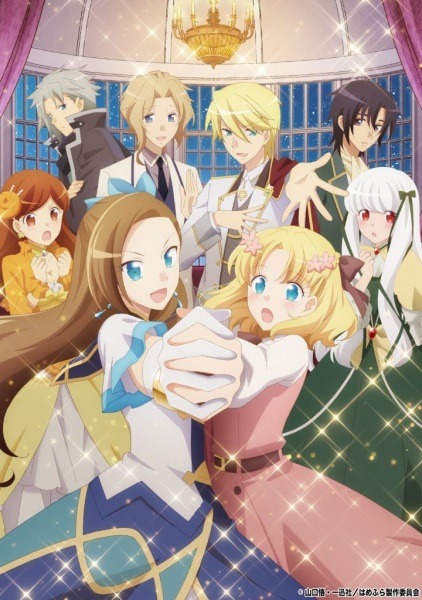
My Next Life as a Villainess: All Routes Lead to Doom! follows Katerina Claes, a spoiled young noble girl deviously scheming to win the heart of a prince- oh wait, never mind, she hit her head and remembered her past life! Turns out she’s an eighteen year old Japanese otaku chick who died and got reincarnated as the villainess in her favorite otome game.
If you don’t feel like reading the wiki article, an otome game is basically a female- targeted dating sim where you play as a blank slate main character and date a bunch of pretty boys (and sometimes girls, but usually only if you go outside the mainstream ones), unlocking their backstories and collecting all the romantic endings.
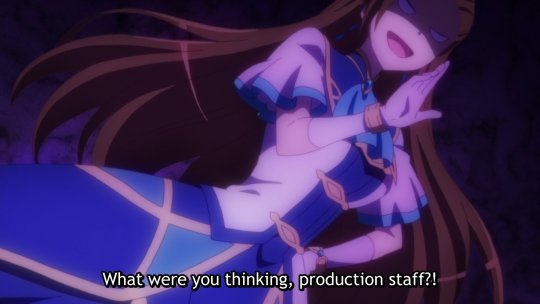
Having played this game, Katarina is well aware that the Villainess character- who constantly tries to interfere with the game’s heroine and whichever boy she’s pursuing- is either exiled or killed in all of the games endings. And now she IS that villainess, living in the world of the game and all its characters! Does that mean she’s doomed to a horrible fate? What’s a girl to do?
Well, if you’re Katarina, what you do is be supportive and kind to the people around you and in doing so accidentally get every single character in the game to fall in love with you. And yes, this includes all the boys the heroine is supposed to date, the other female romantic rivals the heroine is faced with and the game’s heroine herself.
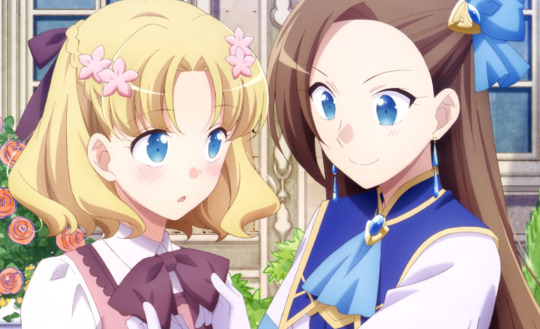
That’s right, we finally got us some bisexual romantic comedy hijinx last anime season, my friends! My Next Life as a Villainess was the delightful little show I really escaped into during these anxious pandemic times . All these girls casually falling in love with Katarina without it being treated as ‘weird’ was what particularly drew me to this show and warmed my gay little heart to see. It was honestly the perfect fluffy, low stress watch during these high stress times.
Anime has long been oversaturated with ‘harem’ stories- where a usually unwitting protagonist somehow gets a bevy of beauties in love with them- but it’s still unfortunately really unusual to see bisexual harems, especially ones with a girl at the center, so right away there’s a big draw to this story that helps it stick out from the rest. (And worry not, the story is largely focused on Katarina having fun with these pals-who-are-not-so-secretly-in-love-with-her, rather than having a ton the dubious shenanigans you see in more sexually charged tales.)
Harem protoganists also famously tend to have the personality of potatoes, being so painfully bland it’s unclear why so many people would fall in love with them in the first place. But that definitely not the case for Katarina. She’s brash, ridiculous, kind and INCREDIBLY dense, and that for a pretty dynamic combination in this setting! She does genuinely come off as a fun person to be around. Unlike a lot of modern isekai shows, she doesn’t stumble into having incredible magic powers or skills, so her compassion is genuinely her greatest strength and what saves the day and wins hearts time and time again.
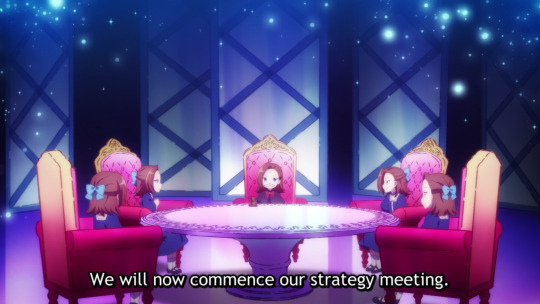
Katarina’s five brain cells doing their weekly check-in
(The moment she won my heart was when she responded to a tragic Frozen style situation with her friend locking himself away from people because he believed his magic was dangerous by taking an axe to his door. My kinda girl!)
The premise also allows for some plausible built-in reasons for the characters to take such special notice of Katarina- having been raised in a different world, she isn’t beholden to all the social rules, class divisions and noble family drama all the other kids in this very specific midevial-esque fantasy world are so embroiled in. This combined with her naturally earnest, accepting and straightfoward nature means she’s able to cross boundaries and reach out to them in a way they aren’t accustomed to. She was significant in each character’s life because she genuinely was the first to show them acceptance and affection without pretense, if only because she isn’t even aware there was supposed to be a pretense.
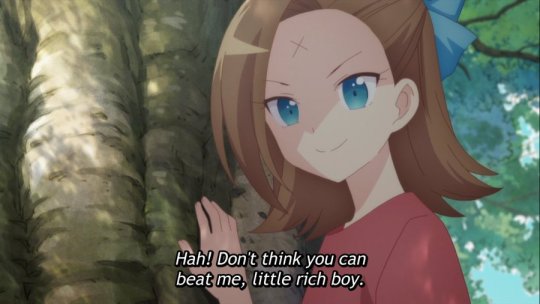
Katarina’s focus on trying not to die and her fear she’s going to meet the same fate as the villainess in the game also at least gives some kind of a basis to her comical obliviousness to everyone being in love with her. She assumes that everyone has to be into Maria (the heroine) and terrified of her because that’s how the game GOES okay, that’s CANON! Of course, this logic stretches thin as time goes on and it would be abundantly clear to most people that things have diverged greatly from the game’s storyline, but the show makes it clear that Katarina’s determined, one track mind is as much a gift as a curse.
Her bullheadedness when it comes to picking up how everyone REALLY feels about her is an intentional gag on the show’s part and even her love interests are well aware of what a colossal dumbass she is and not afraid to point it out!
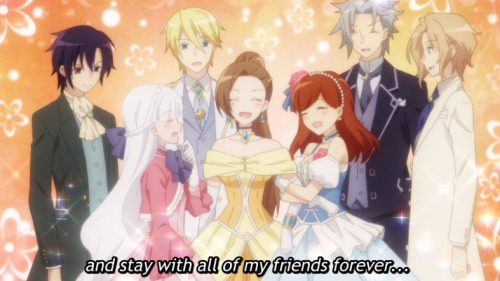
My Next Life as a Villainess isn’t without its flaws, and the personalities/backstories of some of the ‘love interests’ Katarina gathers may be a stumbling block on some- mostly the male ones. Geordo, “the black hearted prince” has a bit of the “ possessive shoujo bad boy” archetype about him, and though he’s far from the worst that genre of love interest has to offer (there’s not much bad he can get up to due to Katarina’s obliviousness, the lighthearted nature of the show, and his rivals constantly getting in his way), the way he refuses to break Katarina and his engagement off despite her repeatedly asking him to, as well as some of his lines here and there, are definitely NOT cute.
Keith is Katarina’s adopted brother, but clearly has a thing for her too. On one hand, they only first met when they were nine and he fell for her pretty immediately. On the other hand, he still refers to her as “sister” constantly which is kinda eesh.
The other two guys are all right- Nicol’s big thing is he’s inexpressive and doesn’t talk much which, considering show doesn’t spend much time inside his head, doesn’t make him a very interesting character in the ensemble (maybe he comes across better in the novels) but there’s nothing wrong with him. Alan is undoubtedly the Best Boy in my book. He’s another common trope- rambunctious and competitive with Katarina but clearly soft for her- but he’s done well and they have a lot of cute moments together.
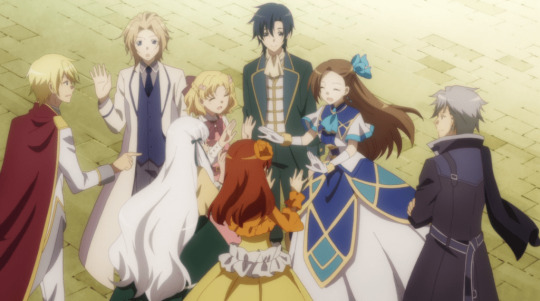
I find the girl love interests to be a much more interesting group overall, though this may be my obvious bias talking. Sophia has the strongest connection to Katarina, their backstories being intertwined in a surprising and touching way (I’m told in the novels her affection for Katarina was treated as more platonic, but the anime definitely plays it up as having romantic elements). Maria’s original role as the game’s heroine puts her in the most interesting position (and would make her the most narratively satisfying choice of love interest, if the show was actually interested in choosing). And while Mary is comically tenacious in her pursuit of Katarina, she’s doesn’t ever act ‘sinister’ or overstep boundaries in the way Geordo does, her “scheming” only really amounting to straightforwardly asking if Katarina wants to ditch her fiance and run away with her.
As I mentioned, one thing that really contributes to My Next Life as a Villainess being a relaxing watch is that the queer characters are treated with casual acceptance. Mary in particular isn’t subtle about her crush on Katarina, but nobody bats an eye at her and she’s completely open and comfortable with herself too. The observing maid notes that the girls are in love with Katarina with the same bland affect as when she notes she notes the guys are. And while the social practices of the nobles are pretty heteronormative- girls are always engaged in arranged marriages to guys, the guys are expected to dance with the girls (something Mary complains about!)- there’s apparently a booming queer romance novel industry that inspires our young wlw.
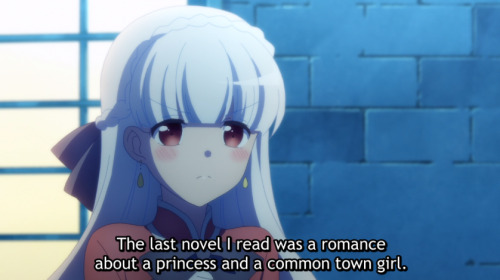
Katarina, having grown up in a different world, seems to be the one most prone to heteronormativity of her group. She never really considers that a girl would ever fall in love with her, but is also never hostile to the idea. It’s telling that when Mary very clearly indicates her desired romantic partner would be a girl, Katarina’s the only one that gets tripped up and has to walk back her assumption that Mary would be talking about a guy.
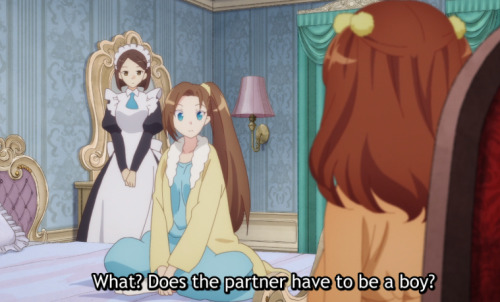
Mary LAYING DOWN THE LAW
Also, Katarina has SEVERAL “she’s so cute! My heart is beating faster!” moments with the other girls, on par in frequency with her moments with the guys. This strongly hints she’s an oblivious bisexual disaster.
So, My Next Life as Villainess is a fun, frothy watch and the rare positive example of silly wish-fufillment that’s inclusive to a wlw audience. But is the actual plot good, or remotely complex? The answer to that is no, the plot is fairly predictable and one definitely shouldn’t got into this story expecting a deep examination of the nature of fate or anything like that.There’s no real explanation of big reason as to why why Katarina was reborn into this game world and so on.
The antagonist that does eventually emerge plays off otome game tropes a bit, but ultimately isn’t that interesting or built up all that well. . The attempts at drama the show makes towards the end fall a little flat, especially since it tends to rely on very-late-in-the-game-exposition-dumps (dark magic isn’t even MENTIONED as existing in this world until like, the second to last episode where it becomes relevant and we get a vague infodump explaining its mechanics). The conflict honestly almost feels shoehorned in and the climax is pretty standard and doesn’t really utilize the big cast of characters all that well
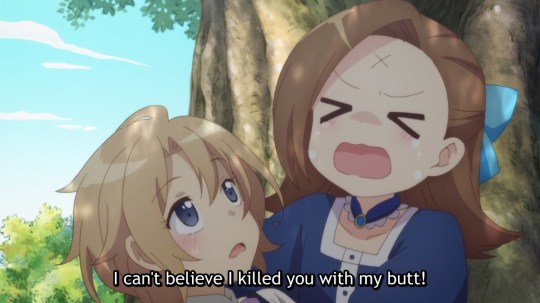
But in the end, that’s okay! The show makes it abundantly clear from the beginning it’s not here to be Deep, but to be some silly fun. And it really fulfills that purpose well, from it’s catchy, peppy theme tune to its consistently warm tone. It MAY get repetitive at times for some, and I do have some quibbles- like how I found the childhood segments to be some of the shows best material and wish we could have stayed in that section for a bit instead of rushing through it, how I wish Katarina had kept her cute little scar, etc- but overall, it was definitely the soothing balm I needed during a very rough time and I absolutely recommend it if you’re looking for a chill, feel-good watch.
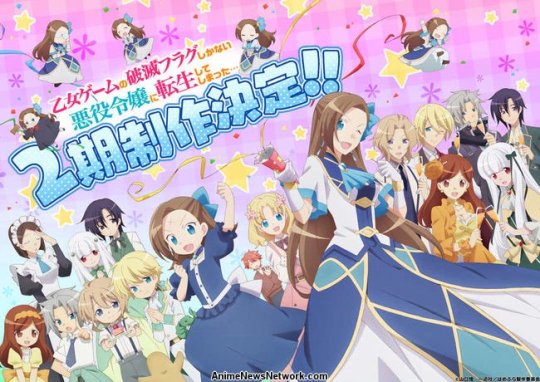
And hey, a second season’s supposed to be on the way too, so there’s something to potentially look forward to!
#my next life as a villainess#my next life as a villianess all routes lead to doom#destruction flag otome#otome gemu no hametsu furagu shika nai akuyaku reijo ni tensei shiteshimatta#anime overview#katarina claes#catarina claes#my reviews#spring 2020 anime
368 notes
·
View notes
Text

Hi, I’m Link and it’s time to talk about my terrible / horrible / amazing taste in men. If you are a bastard who is planning to destroy the world because of your unresolved trauma, please call me. Kiss kiss.
Also I’m tagging @thyandrawrites and @inumaqi who by law have to do this with me.
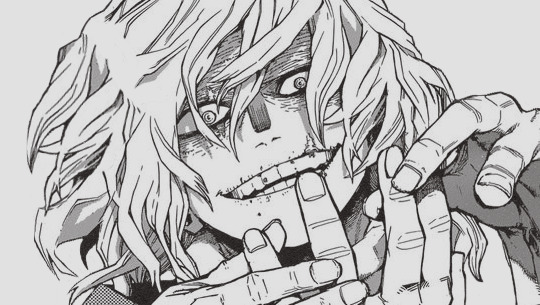
Shigaraki Tomura - MY HERO ACADEMIA
“What I really despise is everything. Everything that breathes pisses me off.”
I like how Shigaraki is severely mentally ill. He’s one of the most raw portrayals of an abuse victim. He murders his abusive father, and the story takes his side. He develops violent tendencies, he refuses to grow up, he can’t forgive. He’s just holding all of his negative feelings inside of him as he slowly rots inside out, and that’s just great.
Shigaraki is so shaped and moulded by his abuse, but he still chooses who he wants to be. He was literally raised in a basement to be a carbon copy of AFO, and yet he’s so different from AFO it’s obvious he could never live up to his Sensei. He’s too bad of a person to ever be a hero, but he’s also too good of a person to ever be the king of evil and what you get is this really chaotic mess in between.
It’s interested to see who Shigaraki chooses to be, in spite of how much he has been indoctrinated towards a cause and how many choices are taken away from him. Despite being a character with supposedly little agency you can see he always tries to fight for his own agency. Don’t deny me. He can’t be with his family even though he loves them, because they’ll never accept him for who he is. Tenko was a kind boy who played with the bullied kids. Shigaraki fights for the people who would never be saved by hero society because he wasn’t saved. He gives them what he doesn’t have, freedom and a place to belong. It’s an interesting character to see how much of him has become the unpredictable ball of trauma that Shigaraki is, while the core of him Tenko still remains in his humanizing moments of how he interacts with the league. Shigaraki who has so many choices taken from him, chooses to reach out and sympathize with the feelings of others, especially those who have been ostracized the same way he has.
Shigaraki is introduced to us as an inhuman monster, and we see him slowly work his way back from the edge. We see him regain his humanity by coming to care about the people under his wing. It gives you the message that there’s no such thing as a point of no return.
All of the heroes are good people in mha but that feels more like an informed character trait. We’re supposed to root for them because… they’re the heroes, they’re good. They have to look good because they’re the good guys. Shigaraki is allowed to be ugly and unlikable, he gets worse. But then he still always chooses to fight for ugly victims like him. I like both sides of him, I like the volatile explosive bomb that just wants to blow up and destroy others, and the gentle way he interacts with the rest of the league.

Kumagawa Misogi - MEDAKA BOX
“I want to beat them. Even though I’m not cool, or strong, or just, or beautiful, or cute, or pretty, I want to beat the cool strong just beautiful cute and pretty people.”
Kumagawa is aggressively mediocre. He’s a good for nothing. He’s like the embodiment of a bad victim, he blames everyone else, he lashes out. He has nothing but flaws but he still strives to be better than what he is. That’s what so inspiring about his character. Even if you’re miserable it doesn’t mean you have to be having a miserable time about it. Kumagawa will push back against anything, even if the whole world is pushing down on his shoulders.
He has a vibe with his character that even if you’re the worst person in the world don’t run away from who you are. You have to accept yourself exactly as you are without lies or artifice before you can start to improve. That’s why kumagawa tries to accept the ugliness of people.
He’s very sympathetic with other people, but that isn’t there to make him look like a good person. If anything he always sympathizes with the victim too much and encourages their worst qualities. At the beginning of the series hes so desperate to heal the wounds of these traumatized, people he’s taken in he just encourages them to lash out because that’s something. Kumagawa is just this very nihilistic, and fatalist character who is somehow at the same time one of the most optimistic characters ever written. He’s a lazy good for nothing, but he tries hard. He’s fickle and childish, but he never gives up. He might never get better, he might always lose in the end, but he still thinks the struggle to win is always inherently worth it. He gives all of himself in everything he does, and to the people around him. And he always gets hurt because of it, but that pain is just living.
He’s completely insane but he’s also living his life the best way he can. There’s just such a manic, insane, and positive energy to his character. Kumagawa will accept you at your worst, and yet he’ll still encourage you to be better. I also like characters written to represent the ugliness in people, and striving to find beauty in that ugliness rather than characters who are just happy all the time because they’re good people.

Natsuki Subaru - RE ZERO
“You think I’m getting drunk on my own tragedy just so I can shut everyone up?”
like how Subaru is a shitty person but not in a really interesting way, but in a really petty, self absorbed and weak way. I like it because the world doesn’t tolerate his bs, he is continually punished and kicked in the teeth for it. He doesn’t have a tragic backstory before the story begins. His tragic backstory is that he did nothing, made nothing of his life, but he still feels entitled and expects to be rewarded. There’s nothing special about him, but he wants to be treated like he’s special.
I’m usually protagonist-phobic because most stories center around the main character so a lot of the time the world bends to their whims in unnatural ways. Subaru is the main character, but hes not the protagonist, and not even particularly important which is why he’s valid.
Subaru is continually punished for his mistakes and I love the way we see how trauma changes him and shapes him. His narrative reads to me as a metaphor for a mentally ill person with the absolute worst habits constantly struggling to be better despite constant backtracking. That’s why with the constant resets in his narrative, none of his actions ever seem to matter. Even when he makes progress he loses it just as quickly, and the world seems indifferent to his suffering. Because the stroy isn’t actually about the world, it’s about Subaru’s personal journey to learn to be a less shitty person.
Subaru is confronted with the fact that hes a very self important and entitled person and he chooses to grow from that rather than run away. He’s so self aware by this point he knows hes the most annoying human on earth and he owns it.

Doma - KIMETSU NO YAIBA
“From a young age I was kind and clever. I always helped people and made them happy, because that was my mission.”
Doma’s story is hard to empathize with because it doesn’t really look tragic. It’s more like a comedy. He’s smiling the whole way through.
Doma feels like an inhuman monster and he chooses to act that way. Literally everything in this story just tells you he was basically born that way. Doma tells you himself. But like, if you look into his background he was raised in a literal cult. Doma despises the cult, because he could see through it. He could see the adults were using him even as a child. But at the same time Doma’s heart has never really left the cult either. Doma, like everybody else, unintentionally reflects the environment he grew up in.
Doma’s just never been shown real tears or a real smile, so he doesn’t know it. He sees his parents kill each other in front of them, and feels nothing, because they literally never acted like parents to him once. He sees life as empty because to him, it is. And then.
By the time he encounters the real thing it’s too late for him. I just like this part of Doma that’s like, emptily trying to imitate all the other humans around him, and feel the things they feel, and always falling short because of his jacked up sense of empathy. It’s adorable. Doma doesn’t feel human at all. He couldn’t possibly understand what a normal human being feels because he’s never lived that life. He’s a total human failure. Rather than try to be something he feels like he’s not, he decides to embrace his inhumanity.
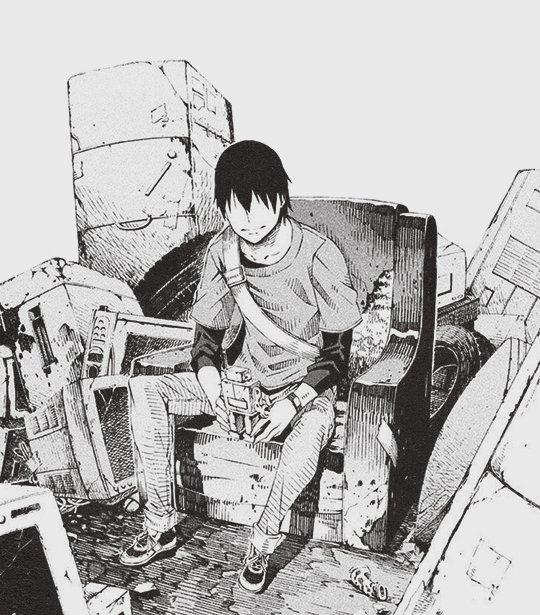
Iichan - ZAREGOTO
“Nonsense.”
Iichan is a character who doesn’t want to choose, but wants to be chosen regardless. In other words Iichan has a paradoxical way of thinking about his life. He’s not the main character. He’s not important. So therefore, whatever happens around him he’s not at fault. However, he is the centerpiece of a tragedy. He’s still important in the sense that all of this tragic suffering is being unleashed upon him. Being the main character of the tragedy means his suffering is important and meaningful, but none of it is ever his fault, and he can’t help it.
That way he avoids ever having to take responsiblity for his actions, or do the hard work of trying to change as a person. He’s a narcicisst, but he hates himself, and he tries to balance out his total egoism by constantly playing up his own suffering and how much he loathes himself. That’s where the main character of the tragedy complex comes in.
What’s interesting about Iichan is that for all the tricks and avoidance he goes through, he’s very self aware as a character. He knows how deficient he is in comparison to others and how his problems really aren’t as important in the grand scheme of things. That’s why it’s interesting to watch all the mental gymnastics he goes through.
Knowing that the author also knows that Iichan is a tool, and clearly frames him as such, I can appreciate the more positive parts of his character. I can know that deep down, despite everything he does want to become a person that’s capable of making the other people in his life happy. He just doesn’t know how.

Hitoshiki Zerozaki - NINGEN
“What a riot.”
Iichan’s equal and opposite force. His boy on the other side of the mirror. What if your reflection in the mirror could talk, and what if it was laughing at you? That’s basically Zerozaki’s character in a nutshell.
Iichan is a character who dwells on his intense mediocrity and desires to be special because of it. Zerozaki is the opposite, he’s been special all of his life and has no idea what a normal life is even like.
Zerozaki is a murderer from a family of murderers and yet he doesn’t enjoy murder. He doesn’t feel its evil or feel a lot of remorse. He feels nothing at all about killing, he thinks people who kill for pleasure are weird, and kills at random.
What I like about Zerozaki is that he’s way more human and down to earth than his perfect foil iichan even though he’s a murderer. Despite being a psycho killer he makes connections with other killers, his little sister, and ninoumiya. A human failure who’s way too human, and that somehow makes him even more of a failure.
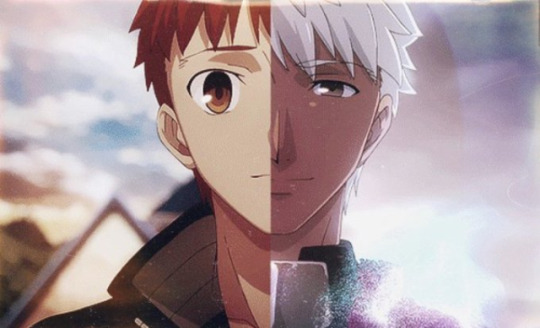
Emiya Shirou / Heroic Spirit Emiya - FATE / STAY NIGHT.
“So as I pray. Unlimited Blade Works.”
Counterfeit. Hypocrite. Holy shit. A fake who knows that his desire to save people doesn’t come from the goodness of his heart, but his own selfish desire to be a hero. Shirou emiya is the only valid protagonist, because he’s an extremely traumatized deconstruction of every protagonist before him. Shirou’s not a good person. Shirou’s barely even a person. He has friends but he doesn’t really feel like he deserves to have them. He smiles, but he doesn’t mean it.
I love how Shirou is so terrible at handling his own trauma that he thinks having a strong sense of justice is a personality. I love how Shirous need to sacrifice himself makes him an idiot and is something his narrative continually gruesomely punishes. He has one of the most brutal narratives ever, and the writing behind his character serves to highlight how Shirou’s bad decision making not only hurts himself, but literally everybody around him.
I love how Shirou has completely emptied out as a person and feels unable to feel basic emotions because its totally relatable. He just copes so poorly, but at the same time there’s something beautiful in Shirous struggle to be a good person. Shirou has completely given up on himself as a person, but he still wants to help other people, and so he keeps trying.
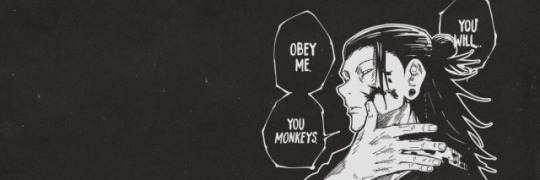
Getou Suguru - JUJUTSU KAISEN
“I hate monkeys.”
Some villains just want to destroy everything for reasons deeply rooted to emotional trauma. I feel like I’m repeating myself here.
I like characters where empathy is a dangerous quality to have. Getou is driven to villainy because he cares, overwhelmingly so. He cares about people’s individual agency and freedom and rights to be happy and sees the world stomp on it. His breaking point was that he wanted a girl who had been raised as a literal human sacrifice for the system her entire life to be able to live out the rest of her life free as a person, and being completely powerless and unable to help her as she was killed. Getou was struck in that moment by the inherent unfairness in the world and it broke him.
Empathy is such a debilitating flaw for Getou that he literally has to decide certain people are human and disqualify others from being human so his brain doesn’t completely break. Being a decent caring guy in Getous world breaks you.
Getou tries so hard not to care, to be the maniacal laughing villain he claims to be, but his empathy is the one part of his brain he can never shut off. Even as the most hated man in the world he protects weak and exploited people and takes them in as a family. He does everything he does to make a better world for the people he cares about, and that’s why he’s so broken because the ones he doesn’t care about he’s completely fine with sacrificing en masse.
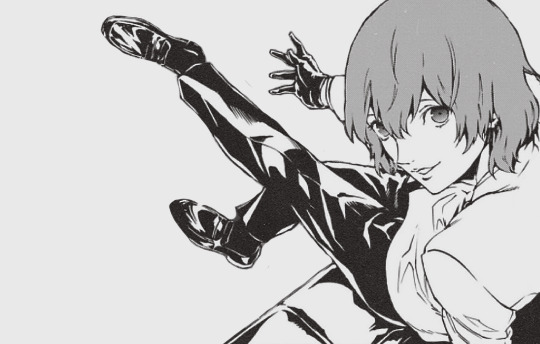
Akechi Goro - PERSONA 5
“JUSTICE?! RIGHTEOUS?! KEEP THAT SHIT TO YOURSELVES! YOU AND YOUR TEAMMATES PISS ME OFF!!”
I like Goro way more for his potential rather than what we see in canon, but there’s a lot of strong ideas his character is written with. I love the idea that Goro wants to be a good person, wants to be connected to others, but is far too dmaged and because of that
He can only pretend to be a good person and play people pleaser to others. he’s someone who desires at the core of his being to be righteous, and failing that he becomes self-righteous instead. I just love how thoroughly fake he is as a person, and how that makes him covet the real thing.
I also love the insane, twisted and obsessive part of Akechi. I love how much he hates the world for rejecting him, and how much of his actions are just petty revenge on the world, his father, every single person who rejected him. I love him when he’s at his most desperate, when he’s screaming at the people he’s trying to kill asking them why nobody wants him around even though he’s famous and popular.

Ogata Hyakunosuke - GOLDEN KAMUY
Walk your own wild path. Straight and true.
Ogata is a character that is somehow incredibly complex and nuanced character with tons of carefully written development in story, and also a character you have no fucking clue what’s going on in his head. Basically, Ogata is a masterpiece.
Ogata feels like the other half of the story. Sugimoto acts, Ogata reacts. Sugimoto chases, Ogata evades. We are uncomfortably deep in Sugimotos head, but we only catch brief glimpses of Ogatas moments of Frank honesty. The entire story is about Sugimoto and Ogata chaisng after each other and everything else seems incidental sometime. Ogata’s not the main character, but he’s the other half of the heart of the narrative that’s about these really, really bad murderous men who are deeply broken trying to find a way to live in a world without war.
Its not that Ogata is unfeeling it’s that he never allows himself to feel. What other characters lost during the war, Ogata never had in the first place. He sees himself as deformed and malnourished compared to everybody else. Ogatas always been noticing the difference between - himself and others.Even if he wanted to love his brother he kept comparing himself to his father’s beloved son, and realizing how much he lacked. He just kept being reminded over and over again what a child who was loved could have turned out as. Eventually Ogata convinced himself he was unfeeling. Because somehow that’s easier. He can process everything that happened in his life if he’s detached from it all watching from a tree somewhere. He’s so repressed he doesn’t allow himself to feel guilt about his brothers death because he doesn’t view himself as a person capable of loving another. However, just like Sugis desire is to be saved from the hell of war deep down theres a kid in Ogata who wanted to be a good son
Ogata is basically my main point of investment in Golden Kamuy, I just want to see him unravel like a big ball of yarn.
#shigaraki tomura#kumagawa misogi#subaru natsuki#iichan#hitoshiki zerozaki#shirou emiya#doma#akechi goro#ogata hyakunosuke#suguru getou#spooky speaks#top ten favorite characters
159 notes
·
View notes
Text
Snape, the Schizoid
Blog 4: 30/07/2020
While I usually write about how Schizoid personality disorder affects me, I think there’s a lot to be learned from drawing comparisons to fictional characters. In fact, before I got my diagnosis, I was writing fanfiction in which I poured very large portions of my soul and very being, often without realizing I wasn’t really writing about other characters, but I was exploring my own inner self. I loved writing about outcasts, about recluses and sometimes I didn’t know if I just was in a sort of love with the characters I wrote about, or if they were me.
At the age of 18, we’re talking about 2001 here, I got into Harry Potter. And with that I mean: I got into Severus Snape. Described as an ugly git and a mean bastard, I still loved him to pieces. (And Alan Rickman portrayed him beautifully, RIP)
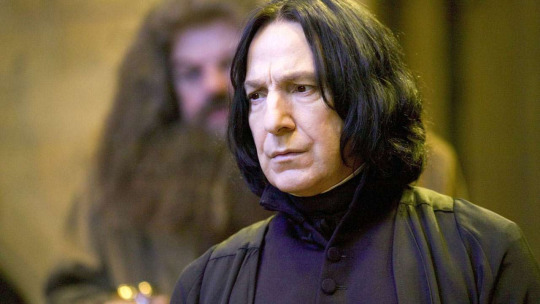
And here might be the reason why he lured me in straight away: Snape is a schizoid, like me. And that only clicked when I got my diagnosis a few months ago. 19 years after first encountering the character. And after rereading some of my own fanfictions, I started realizing that what I’d described as Snape’s problems and needs in those stories, were my own. Strange how that works!
In this blog, I’m going to run over some traits of SPD (schizoid personality disorder) and explain how Snape fits into the criteria.
This post serves three purposes:
To people who have no idea what schizoid personality disorder is, this is a means to familiarize yourself with the disorder by exploring the traits while you imagine a character you already know.
To people with schizoid personality disorder, this is just meant to be a fun little blog where maybe you can recognize some traits of yourself. No worries, I have not forgotten we’re all on a spectrum and each schizoid is different.
To fans of the Harry Potter novels, I hope that you come to realize that people can identify with flawed characters for very personal reasons. Don’t be mean to fictional characters (unless they’re Umbridge I guess XD), because you never know who identifies with them. Your rejection of a character can feel like the rejection of a person who struggles with the same things. Anti-culture, in all fandoms, has to end. It’s not adult. It’s not wise. It’s mean. It’s exhausting.
I also feel like I need to make a statement about JK Rowling’s intent: I doubt she knew what SPD was when she wrote Snape. She said she based him off of one of her old teachers – no idea if that man had SPD or was just generally unpleasant. The way that Snape matches SPD is eerie though, just like Luna matches schizotypal personality disorder rather well. (More on that later.) An actual psychologist might disagree with me and say “No he’s not schizoid because….” – and hell, I’d love to hear it. I don’t mind it if this post, written by a schizoid but not a psychologist, starts a discussion that will help people understand the disorder even better, even if I’m wrong in assessing Snape. Or if we can learn to understand Snape better because of me being wrong, that’s also a win-win situation.
Ready? Let’s dive into it!
Cause
SPD is said to be caused by a combination of genetics and environment – as is the case with many other personality disorders. But ask around in schizoid groups, and most will tell you that there were issues in childhood with abuse, lack of warmth or understanding at home, or the presence of a “bad parent”. According to webmd: “Some professionals speculate that a bleak childhood where warmth and emotion were absent contributes to the development of the disorder.”
We all know that Snape’s early childhood was not a happy one. He had an abusive muggle father and grew up at Spinner’s End, the opposite of what you could consider a happy childhood home.
When you grow up in a loveless home, it ruins a lot of your own enjoyment of life. You get trust issues, you become awkward, and so when Snape finally arrives at Hogwarts, he gets bullied. He’s already rather isolated (he only had Lily), and they picked on him because kids can sniff out weaknesses and he was an easy target.
The bullying did nothing to stop the disorder from developing further. Many schizoids have gone through bullying themselves, and it does nothing to help you grow closer to human beings as you get older, quite the opposite, a bond of trust is broken and it’s incredibly hard to heal that. You’ll be suspicious of everyone you meet once that sort of thing happens. The more bullying you receive, the more you hate the world as you grow up. Maybe that’s not true for all people or all schizoids, but I bet some can relate.
You might say: “But Harry also got bullied at the Dursleys and he turned out fine!” Well, I guess he did. That’s the thing with many heroes – their tragic backstories make them poster boys of “look what they overcame and how he saved the world!” – but it’s not that realistic, and if you’ve got a genetic predisposition to develop a personality disorder instead, you’re screwed. Let’s also not forget that Harry’s first year in life was a very loving one. The very first year in a child’s life is crucial, and if things go wrong in early childhood, that leaves scars that most people carry with them for the rest of their lives. Snape never had that steady sort of home, not even for one year, or if he did, there’s nothing to indicate he did.
Diagnosis Criteria
Okay, time to get digging! According to the DSM-V, you need to display at least four symptoms in order to be diagnosed with SPD. Also keep in mind that these traits need to be present for longer than just a few months or a year or so. You might recognize some of these traits as something you’ve gone through yourself if you’ve ever been depressed – it’s when these traits last for what seems like your entire adult life, that a diagnosis with the disorder can be made. (I’m also not familiar with every other trait of every other disorder in the DSM-V, so as I stated in the beginning, it’s possible that other personality disorders are even more fitting of Snape, but that I just don’t know them yet.)
The seven criteria are:
Lack of desire or enjoyment for close personal relationships
Always chooses solitary activities
Little or no interest in sex with other people
Experiences little pleasure from activities
No close friends other than immediate family
Indifference to criticism or praise
Emotional detachment and lack of emotional expression
➤ Emotional detachment and lack of emotional expression
While this is usually at the bottom of the list, I want to put it on top. This is what they also call “flat affect”. You can give us a present, and it might seem like we’re not truly grateful. We may laugh with a joke, but the light never reaches our eyes. Emotionally, it doesn’t seem to an outsider like there’s a lot going on, and if it is, it’s going on so deeply within our souls we’re hardly aware of it ourselves. Think of Snape’s monotonous voice when talking. Now Alan Rickman is a brilliant actor and emotes with very very small signs sometimes, and it’s not like when talking to me, you’re talking to a wall. (But my empathic mask makes me appear rather normal to most folks.) (I don’t think Snape has a mask like that.) Other characters that have schizoid traits are, for example, Mai from Avatar the Last Airbender or Geralt of Rivia from the Witcher. If you know and visualize these characters, you may understand better what I mean with the “lack of emotional expression” then. Also, Snape being a great Occlumens? It’s because he’s the reigning champion in suppressing his emotions, like all schizoids are. We would make wonderful Occlumens, I think. XD Snape being mean? Not all schizoids have a good amount of empathy, they’re too emotionally detached for that. (Others are very empathic to some causes, but might be picky in what they are empathic about. For example: they can be empathic towards animal cruelty and Black Lives Matter, but don’t give a shit about other causes.)
A lack of empathy is what makes plenty of people an easy prey to fascists. Without empathy, what moral compass is going to stop you from becoming a bigot? (And I also want to state that within the disorder you’ll probably find people of all political leanings – many schizoids also seem to have a thing for the underdog, and thus seem to often lean towards the left instead of the right side of the political spectrum. But as with ‘regular’ people, you’ll find people swing both ways.) But here, in Snape’s case, his hatred for his bullies and his father (a muggle) pushed him right into the Death Eater’s arms, and they were glad to welcome a man of his skill, maybe even giving him the illusion, for a while, that he had found a new family. It didn’t last, and eventually his eyes opened to what the Death Eater’s really were. He was too young and naïve to see what they wanted of him (and the one person he loved), and it basically ruined his life. He was a teenage fool, and after losing Lily’s friendship, he had no one left to keep him out of that bad group of friends.
➤ Lack of desire or enjoyment for close personal relationships
Does Snape strike you as the social type that’s trying to make new friends all the time? Have you ever seen the man enjoy the company of another character in the books? Not just tolerate, not just need, but ‘enjoy’? Even when it comes to Lucius or Karkarov, it seems he is just keeping an eye on them, observing them rather than offering true friendship.
Maybe McGonagall might be an exception. He seems amiable towards her, in a competitive way. He might get a kick out of their arguing. She’s certainly an intelligent woman so he might enjoy her company for intellectual reasons.
➤ Always chooses solitary activities
We see Snape engage in a few activities at Hogwarts, such as going to Quidditch matches, or being present at the Yule Ball. Death Eater meetings and gatherings in the staff room might be social activities, but let’s not pretend Snape has a lot to say about whether he attends those or not. As a teen he already excels at potions, a solitary activity, and when we are given a glimpse of his “summer” lifestyle at Spinner’s End in Half-Blood Prince, he’s just reading. He certainly doesn’t entertain a crowd in his spare time, like, for example, Slughorn does.
➤ Little or no interest in sex with other people
I hear you coming now. “BUT LILY!” Schizoids are often asexual, but not necessarily sex-aversive. When asking around in a schizoid group, about a third of the schizoids seem to be in relationships or are even married, perhaps even more. And many of the others have had sexual relationships in the past. Many have tried to make relationships work, only to realize at a later point that that sort of life was not for them and that they would never be truly happy in a relationship. Other schizoids are happy in relationships – so it exists! It’s not impossible! (Remember: you need 4/7 traits, not 7/7 to be schizoid.) Also keep in mind, if Snape really was interested in sex, why would he pine after a dead woman for 16 years? He’d be over her way sooner and into someone else’s pants way sooner too. Lily was the first person in his life that gave him any kind of warmth, so him pining after her is not strange or inexplicable behavior. She offered what he craved, what he lacked, and he mourned her for the rest of his life, because he feared no one would ever give him that warmth. (And he kind of turned that into a self-fulfilling prophecy by being such a recluse.) He dreamed of love, but we have no idea what it would have been like had he actually ever had his affections returned. Maybe he’d have enjoyed a relationship with her for a long while and she would have been the only person he could have tolerated, or maybe after a year or so he would have thought “this is suffocating” and ended the relationship.
➤ Experiences little pleasure from activities
Can you recall Snape laughing in any scene? Smiling, even? I can imagine him to feel rather content when brewing potions or studying the dark arts, and he does have passion for what he does. But to a schizoid, passion and pleasure are not necessarily the same. We experience emotions differently. In some ways we don’t experience them at all, in other ways, we might feel like there’s a wall around our emotions, and we have no idea how to get over that wall and check what the currently active emotion is. But with logic, we can determine “I guess I’m happy now that I’m doing this thing I like doing.” Intellectual pursuits are fun too – like solving a puzzle, it gives a little boost of dopamine when you make it to the next level, so it’s not surprising he excels at Potions.
➤ No close friends other than immediate family
Basically, Snape only really had Dumbledore, and that bastard only used him to win the war. (I have beef with old Dumbledore, okay?) But Snape confided in Dumbledore, and the other way around, and so I think it’s safe to say that there was a true friendship between the two. When Dumbledore died, Snape was truly alone. (Which is incredibly tragic and heartbreaking when you think about it – in the last year of his life, Snape had no one, really no one, as he tried to keep Hogwarts ‘safe’ and eventually died. And everyone hated him for killing Dumbledore, not knowing the truth about his allegiance. Everyone who had once spoken kindly to him, like the other professors at Hogwarts, now considered him arch enemy #2, behind Voldemort.)
➤ Indifference to criticism or praise
Compliment or insult a schizoid, and it’s not like they won’t give any response at all. They might say “thank you” or they might get a little defensive about the insult, but they won’t always lose a lot of sleep over it. It kind of depends on who the praise or criticism is coming from. I can imagine that it did mean something to him if it came from Dumbledore, whom he cared about. I don’t think it meant anything to him what his students thought of him, since he didn’t give a personal level of shit about them. There’s also a moment where Umbridge shrieks “You are on probation!” and it’s described as “Snape looked back at her, his eyebrows slightly raised.” Then she says that she expected better after how highly Lucius Malfoy always speaks of him and she dismisses him. Snape then gives her “an ironic bow” – he really doesn’t give a rat’s ass and I love him for it.
These are the 7 criteria that you need to fit 4 of to be diagnosed with SPD – I managed to link all 7 to Snape – so I think it’s not unlikely that Snape is truly a schizoid. Now, for the next part I would like to highlight some other comorbidities which many schizoids also have, that seem to appear in Snape as well.
Comorbidities
➤ Depression In about half of all schizoid patients, depression is or has been present. How do you notice that in Snape? The greasy hair, among other things. Bad teeth. Always wearing the same outfit. If you’ve ever suffered from a bad depression, you know how difficult it suddenly becomes to shower at a regular interval, how you can go days without brushing your teeth, how wearing comfortable clothing is more important than looking fashionable – how it is absolutely meaningless to look fashionable because who the fuck cares anyways. Snape doesn’t seem to give a hoot about himself or his appearance, which strikes me as a sign of depression. And what does he have to be happy about? He knows Voldemort is going to return and he’ll have a cursed job as a double-spy. He knows he’s probably going to die. I wouldn’t be happy either.
➤ Anger Outbursts/PTSD Not all schizoids have this, but it’s something I have myself and which I’ve written about extensively in one of my previous blog posts. I look at it as a way of my inner self breaking down the walls and coming out to say “I know that I’ve been quiet for the past 37 years but what the fuck I’m really angry about this and have been for a while and I’m not going to contain it any longer” – and then the anger comes out disproportionately. It’s hard to impossible to really control such an outburst. And often, there is a very obvious cause to the outburst. Sometimes it’s PTSD related. For Snape, while he does not emote often, you see a few outbursts – like when he is face to face with Sirius Black in the shrieking shack, his childhood bully. He seems mad at that moment, not at all composed anymore, the sign of a real anger outburst. (I think it’s PTSD helping that anger build.) A few moments later, he thinks he has turned in Sirius Black to the Ministry, Sirius, who he holds responsible for the death of James and Lily (and it’s especially the latter’s death he can’t cope with), so when Sirius escapes, he loses it again. Then the next time he gets really angry is when Harry enters his “worst memory”. That’s a few years later, during the Occlumency lessons. While he’s no longer shrieking, he’s white with rage. My pro tip: don’t impose on the privacy of a schizoid, we get mad. XD In Half-Blood Prince, he’s got a moment where he’s like “Don’t call me coward!”, looking ‘inhuman’. I too can get anger outbursts over false accusations, and this one must really hurt, because at that moment, he’s trying to save Harry’s freaking life while the boy is all like “lemme at you I’mma kill you like you killed Dumbledore for fun!” – Snape was probably grieving the loss of his only friend and confidant and knew he was on his own from that point onwards, and then you get this bloody teenager trying to drag you into a wizard’s duel you’re not in the mood for, calling you a coward, which is the last thing you are. Man it has to suck to be Snape. I also want to state that there are many moments when things go wrong in class, but Snape never loses his temper like that. He’s not pleasant and he punishes students, but he doesn’t get mad – he gets even. That makes it all the more interesting to analyze the moments that he does go bananas.
Random Thoughts
Before I finish this blog, there are still a few small things I’d like to get out of my system about Snape and SPD.
➤ Snape and Luna
They are my favorite characters, but also because they’re very, very alike and very, very different at the same time. Both didn’t have a great childhood (Luna lost her mother at a young age) and they get bullied as kids at Hogwarts. Snape is called Snivellus and Luna is called Looney. All the suffering they endure, affects them differently though. Snape gets meaner, Luna only seems to get nicer. I see them as two sides of the same coin. One dark, one light, both a little eccentric in their own way. When you look at it from a personality-disorder point of view, then they both have personality disorders that are related to one another. Snape has Schizoid Personality Disorder, Luna has Schizotypal Personality Disorder. Schizotypal Personality Disorder is where you’ll find a lot of eccentric people who believe in conspiracy theories. Both are class A personality disorders. Some people might even have the two personality disorders at the same time. Schizoids seem to be rooted in reality with their thoughts, schizotypals can really start believing strange things if they’re not careful, alienating them from others And, in case you’re now wondering: “So many schizo-personality disorders! Is this also schizophrenia?” No – schizophrenia is when you have delusions and hallucinations as well. Read up on those disorders if you’re interested, because these descriptions of mine are too brief and don’t do it justice.
➤ Snape was a bad teacher
Not fully, and yes, he was. I think knowledge-wise, Snape was way better at Potions than Slughorn ever was. You notice when Hermione can’t keep up in her sixth year while Harry is sailing through Potions thanks to Snape’s book. Snape’s a genius and would have been able to instruct his students to be more efficient when brewing potions. But personality wise? Don’t put a schizoid in front of a classroom. And for that, I kind of blame Dumbledore. Snape wasn’t asking for a job as a teacher, but that’s all Dumbledore had to offer, and thus he put Snape and his unwilling students in a room together where none of them wanted to be. I think Snape would have been better off as some kind of a scientist, just him and his books, inventing spells or potions. But he was not given much of a choice, and he was forced to socialize with teenagers (ew, gross), and that must have drained him terribly. It’s a wonder he was usually roaming the hallways at night because I would have been too exhausted to get out of bed. That makes you realize it’s truly a work of fiction because who on earth has that kind of stamina? :-P (No, in all seriousness it’s probably also depression at work, keeping him up.) Snape was a jerk to Harry and Neville and Hermione on various occasions, and not all of it was to “keep up appearances” to the Slytherins. He seemed to even enjoy a bit of sadism here and there. You could contemplate why he poisoned Neville’s toad. Was it just to spite poor little Neville, or was he hoping his student would perform better under pressure? (Which Neville did.. The toad didn’t die.) It’s a cruel way to teach a lesson, but I think he must have thought the end justified the means. But what a traumatic experience to Neville, who then had Snape become his greatest fear.
➤ Purity culture vs Snape
We’ve seen a shift on both Tumblr and other social media where fandom is about purity culture. Back in 2002 folks were like “We love the baddies, deal with it”, and the people that didn’t love the baddies actually dealt with it and you could joke with people who preferred the Gryffindors and just poke a little fun at one another, but it was fun fandom. But over the years I’ve seen fandom change. Nowadays you can’t even express love for Snape without someone seeing it as their moral obligation to remind you of what a “bad person he really was”. To them I can only say that I like him for his best qualities, and forgive him for his worst. And honestly, I don’t need to justify liking a character to anyone. If I want to put Umbridge-posters in every room of my apartment, are you going to stop me or call the cops on me? Purity policing is weird. Very American, too. (Though I’ve seen some Dutch folks go apeshit as well over purity concepts.) And as a Belgian I don’t have time to put up with that shit. XD And purity policing also is just nasty when you consider that some folks are like “I relate to this character” and the next person is like “THIS CHARACTER IS EVIL AND DESERVES TO DIE!” My response to that part of fandom is: “Just fuck off already, jerkface.” Personally I was heartbroken by his death, because I feel like he could have made up to the people he’d hurt, I would have loved to see relationships mended between him and McGonagall and him and Harry and such, but instead we were left with him passing on some awkward memories to Harry and then dying. (Tbh I’m not the greatest fan of his crush on Lily, but whatever, I can accept it and understand it. She was the only light he ever knew.) It’s not his fault he didn’t get to redeem himself as a character, not fully - and that’s what makes fanfiction fun. So if people want to explore that in fic, let them. A character like Snape is too much of a treasure to shove under a carpet and pretend he never existed. Write all the things about him, have him have all the adventures!
I think I’m done now! If you stuck around until now, 10 points to Slytherin or whatever house you’re from. (Probably Slytherin if you’re reading about Snape.) What do you think? Feel free to leave a comment, send an ask, or whatever!
50 notes
·
View notes
Text
When Your Love Hurts - fic
Characters: Damian Wayne, Conner Kent Pairings: jondami, timkon Summary: Damian didn’t expect his brother-in-law to break into his office today. He also didn’t expect the reason that he did so. A/N: In which I write about Tim but I’m actually writing about myself, whoops. Tim did show up to Jon’s office, whatever that is I haven’t decided, and Jon just immediately took him back to his and Damian’s house. I might write more for this little scenario, or I might not, I dunno. As soon as they kind of make up a little, Tim and Conner immediately bombard Damian and Jon with questions about when they’re getting married. Damian surprises himself by not regretting a single bit of it. He loves this new life.
Freedom AU
~~
He heard a commotion in the lobby. Nothing new, not in a place like this. Dogs barking, scared cats, sobbing persons giving up their animals, angry ones trying to steal theirs back. The shelter was almost like Gotham, but nothing he, or his staff, couldn’t handle.
In fact, this commotion was more his staff than anyone else, he noted. Trying to…stop someone? Or get more information, perhaps. The dog currently recuperating in his office, Isabella, heard the noise too, and raised her head to growl.
“Sir…sir, wait!” The call was much closer than the lobby. Damian glanced up just as his doorknob turned. “You need an appoint-”
The door swung open to reveal a man in red plaid underneath a leather jacket, jeans and sunglasses. He let the office door smack against the wall, and under Isabella’s barking, Damian could only sigh.
Not the boy from Smallville he liked to see.
“Hey, Dames.” Conner grinned, raising the sunglasses to sit on his head. “Have a sec?”
“I’m so sorry, Damian, I tried-” the receptionist rambled behind him. Damian waved them off.
“It’s fine, he’s…family.” Damian said reluctantly. The receptionist glanced between them and nodded, disappearing back into the hall. Damian glared at Conner. “I told you not to call me that.”
Conner shrugged, closing the door behind him and dropping into the chair across from Damian’s desk. Immediately, his ‘cooler-than-thou’ façade dropped, and he ran his hand down his face. Isabella gave a small woof and stood, jogging over to slot her face between Conner’s knees.
“If you’re looking for your brother, for the millionth time, he does not work here. He has his own job.” Damian hummed, going back to his paperwork. “But I’m sure he’d love to catch a late lunch-”
“Not looking for Jonno.” Conner droned. Dropped his hand and gave a weak smile to the dog waiting for love. “I am actually here looking for you. I guess. I don’t know.”
“Oh?” Damian put his pen down, giving the other his full attention after fixing his glasses. “Everything…okay?”
“…Yeah.” Conner sighed again, taking Isabella’s muzzle in his hands and petting along her whiskers. “…Your brother is an asshole.”
Ah.
“I mean, they all are, but I’m assuming you’re speaking of one in particular.” Damian surmised. “…Does he know you’re here?”
“No. And if he does, he clearly doesn’t care.”
Damian almost scoffed, because that couldn’t be further from the truth. Tim cared about Conner more than probably anyone else. He did marry him, after all.
“I see.” Damian said instead. “What happened?”
Conner shrugged, focused on Isabella.
“Conner, you just broke into my office.” Damian hummed calmly. “I think I have a right to ask what you and my brother fought about that caused you to do so.”
Conner still held out, still remained silent for a few moments.
“…He doesn’t care about himself. He doesn’t take care of himself.” Conner muttered. “Says it’s a waste of time, and that his energy is better spent taking care of other people. Taking care of me.”
“You’ve known for years we’re all a bit…self-sacrificing.” Damian admitted. “What made it so bad this time?”
“He just...won’t even consider it!” Conner snapped. “I even begged him to take care of himself, for me, and he refuses.”
“It is…a flaw. One he’s carried for years. Even Grayson couldn’t rid him of it.” Damian sighed sadly. “He’s never thought he was worthy, or mattered.”
“And he does! He matters!” Conner cried, slumping back in the chair. Isabella tried wagging her tail to regain his attention. “He matters to me, to our friends. To you, I’d hope.”
“Of course he does.” Damian agreed quickly, trying to push down the feeling of being offended. It’d been years since he and Tim had been at odds, Conner knows that. “To me and the entire family.”
“And that’s why I’m here, because you get it. You get him.” Conner deflated. “But more than Dick or Bruce, you don’t feel a need to go running to him and tell him everything I said or…or try to fix everything right in that moment or whatever.”
“Because he’s a grown man. I can’t fix his problems for him, and pressuring him in a demand he talks has the opposite affect. One day our father and brother will get that.” Damian nodded. “However…in Drake’s defense, I know the feeling. You know, of not mattering, or being worthy.” Damian snorted. “I know it all too well.”
“Yeah, but you got over it.” Conner whined.
“Well, for one, that’s a far too oversimplified conclusion, as I don’t entirely agree with that personally.” Damian scolded. Isabella whined at Conner’s knees and jumped up to put her paws on his thigh. “And two, I’m only dealing with it in a healthy manner because of your brother.”
“What, did he just overwhelm you with his undying love, to the point your brain couldn’t not believe what he said to you?” Conner pouted, crossing his arms. Isabella tapped at his leg, but he ignored her.
“In the attempt to not, again, oversimplify it while not getting into a discussion of my own personal health and derail this entire conversation – yes.” Damian snapped his fingers and Isabella hopped down, trotting back to his side. “But that also took years to even get to that point, and Jonathan knows it continues to be an ongoing process.”
A pause to glance down at Isabella. She gave him a doggy grin.
“But that is also me. A person who had a poor upbringing and was not told explicitly I was loved until I was eleven, by Grayson.” Damian explained. “Timothy, if I had to guess based on observation and experience, did not have that tragic past. His idea of his lack of worth most likely comes from dealing with our father’s grief in the aftermath of Todd’s death, and then continually losing loved ones to violent deaths every few months for a number of years. He believes it his fault, that his presence somehow forced those tragedies to occur, or that he should have been able to fix said emotional issues of others, like with my father.”
“So…what you’re saying is that me telling him I love him more than the goddamn sun like Jon did and does for you won’t work.” Conner exhaled.
“Not necessarily.” Damian admitted guiltily.
“So…what do I do?” Conner asked pathetically. “Because I don’t think I have to tell you that I love him more than anything in this solar system. But I can’t…he’s breaking my heart, Damian. I can’t live this way.”
“And you shouldn’t. But I am sorry you are.” Damian nodded. “But, again, if I had to guess, based on what you’re telling me…he knows that. He knows he’s breaking your heart, and he blames himself for your frustration. He probably believes if he was better, if he wasn’t so worthless, or maybe even selfish, he wouldn’t have frustrated you.”
Conner tilted his head to the side thoughtfully. Isabella barked at Damian.
“And if in your arguments he’s yelling at you, it’s because he’s also frustrated with himself. Because he wishes he could believe you, wishes he could fix his brain and make all the disbelief in himself go away. But then it restarts the cycle of believing he could and should be better, thus cementing the idea that since he’s not, he’s worthless.” Damian leaned back in his chair, circling his hand in the air as he spoke, reaching out to pet Isabella with the other. “Logically, I’m sure he’s fully aware of all these problems. But emotionally, he just can’t fix them, as much as he desperately wants to.”
“So…” Conner repeated. “What do I do?”
“Educate yourself, for the time being. I told you what I believe, take that into account if you wish.” Damian shrugged. “But in the meantime, just stay with him. Know he’s trying, even through your mutual frustrations. And as cliché as it is, don’t go to bed angry.”
“What?”
“It’s…what Jon did.” Damian admitted quietly. “We would have fights that probably rival you and Drake’s. One of us would often storm off, without anything being solved.” Damian looked at Isabella, giving a soft smile. “But…every night, even if it was past midnight, Jon would come home, or find me wherever I went, and just lay in the bed with me. We didn’t always apologize, or even say anything. But we still went to bed together, still held each other.”
Conner waited.
“It didn’t fix everything, or probably really anything, but it was evidence, to that little demon in my brain.” Damian continued. “It…also helped when I, when we, left the costumes. But I’d never ask that, or even suggest that, to you or him.”
Conner smiled. “Because you and Tim are different people.” Damian chuckled. “And you each need different solutions.”
“So you do listen sometimes.” Damian shook his head. Just as he did, he got a text, his phone buzzing underneath some of the papers on his desk. Already having a feeling he knew who it was, he dug it out and picked it up.
It was a picture. Tim lying pathetically on his living room floor, surrounded by many of their pets, clinging to the closest cat.
I believe he’s here looking for you.
Damian snorted, texting back, ‘Be home soon. Please speak with him in the meantime about how you and your brother’s minds work. Also ask him what he wants for dinner, since it appears we’re having guests.’
“I should charge you and Drake for therapy services.” Damian murmured, lifting his phone to snap his own photo of Conner, slumped childishly in his chair. He sent it immediately.
Jon quickly responded. Niceeeeeeeee.
Damian grinned at the childish response, then glanced down to the dog at his side. “Would you also like to accompany us for dinner, Izzie?”
Isabella barked and wagged her tail.
“What?” Conner asked dumbly. “Who’s going to dinner?”
“You.” Damian hummed, standing. “And then I’m locking you and Drake in our guest room where you can fight or fuck it out. You choose. Then you’ll be staying the night.”
Conner shook his head. “Got patrol tonight.”
“As I’m sure Drake did too. But considering he’s currently trying to smother himself in the fur of my cat, I believe those plans are all cancelled.” Damian walked by, Isabella following, grabbing his car keys from the hook by the door. “Also, if you really think you’re leaving without staying the night, you don’t know your own brother as well as you believe you do.”
Conner groaned, but stood anyway, following behind Isabella like a scolded child. “I was…kind of hoping Jon wouldn’t know I was here.”
“And I would have let that happen if my brother didn’t show up on his office’s doorstep as well.” Damian smirked, opening the door. “You and Drake are predictable and far too similar.”
“Almost like we’re an old married couple.” Conner drawled. Damian laughed. “…Thanks for your help, though. I do appreciate it.”
“I’ll accept that appreciation only if anything I told you actually helps Drake heal, in any way.” Damian countered. He hesitated in the hallway, though, and glanced back. “Remember, this process will take time.”
“I know.” Conner smiled, he put a hand on Damian’s shoulder. “That’s why if you lock us in your guest room tonight, we’re absolutely fucking. Because this fight won’t be over for a long time.”
Damian frowned. “You’re disgusting.”
“But you love me?” Conner tried, waving to the front desk staff as they walked out.
Damian sighed as Isabella ran ahead, jumping and barking back at them. “Only for the sake of my boyfriend and my brother. And even then, only sometimes.”
“I’ll take sometimes as a win.” Conner grinned as they got into Damian’s car. Isabella happily wiggled in Conner’s lap. “Now, chauffeur, please deliver me to my husband.”
Damian just sighed and pulled out of the lot.
32 notes
·
View notes
Note
I see you like rdr, and I saw your post about Jamie. Do you think that Mary actually loves Arthur or that she only uses him? I think she only uses him because she knows he’s madly in love with her... it’s sad, but I feel like she’s kind if like Dutch when it comes to using Arthur for their own benefits, what do you think? I’m sorry if you don’t do asks like these, then you can just leave it be :)
Don’t be sorry - I love talking about rdr! And I don’t think there are any asks I don’t “do” - except for the obvious trolls - nowadays I’m more responsive the less time or mental effort it takes for me to answer, due to my all consuming personal projects. I have some really interesting asks I sadly haven’t found the headspace to sit down and devote the time to that they deserve. So what I’m trying to say is: I greatly appreciate when people send me asks, and my inactivity is not a sign towards the opposite. Thank you for the ask!
Anyways! I may be a very naive man, but I want to believe that Mary does love Arthur. I have my issues with the way she’s treated him at times, but I believe these instances have been a tell towards her character rather than a sign of deliberate, unfeeling manipulation.
We have to realize what it means that Mary and Arthur had such differing social statuses. Mary’s father was strongly against their relationship, and I believe this is a lot more important than it initially sounds. Today, the demand for people to see others as equals, has much stronger legs to stand on. A young woman will likely feel less alone and socially endangered by standing by her socially poorer love interest today, than back then. Marrying down, could cost her a lot more back then too - being disowned by family was a bigger risk, as well as all upscale social circles turning their back on you with so you can’t recover and prove them wrong.
Before I start giving a lecture on historical social differences that I in no way am qualified to give, I’ll just summarize instead: Mary had all her wealth, all her connections, social life, and a safe future to lose by sticking with Arthur. Her father would not come around and I’m confident he would not give her another cent of his fortune. Being poor back then, could mean your death.
Her father was also an imposing and allegedly abusive. She could feel threatened by that fact alone, to marry within her own social status’ circle.
But more: Arthur wasn’t just poor; he was an outlaw. A criminal. Whether Mary understands what morals the Van der Linde gang sought to follow or not, the world would not. He lived a life she’s neither comfortable with, not wishes to take part in. She seemed to love him despite it, not because of it - and I’m sure her daydreams consisted of a life in which she managed to reform him and pull him out of this. That he could be molded into a good husband who lives an honest albeit hardworking life.
As much as she loves him, we have to respect the fear she must feel involving herself in this kind of lawless company. I’m sure she’s teetered a lot on that fence of “I love this man - but this life is dangerous and I could lose it all and the whole thing makes my alarm bells ring”. She probably second guessed herself a lot. What is the right choice? The love of her life but a nightmare life? Can she pull him out of it? Will her attempt to make it work with him only damn her? Or will she damn herself by giving up on true love? IS it true love to begin with? Can it last?
My favorite aspect of their tragic love story is that Mary probably was battling quite a bit of embarrassment regarding her young, wild lover. With all their money and posh life, I’m sure Arthur broke a lot of unwritten social rules without knowing it. Like not knowing what cutlery to use to what dish, if he ever got to eat at her house. He probably couldn’t tell that he smelled strongly of wet horse, sweat and dirt, while Mary would fight to keep her embarrassment over this in check when he came knocking and someone else opened. I can picture her not minding him and all his rough ways when they were alone, but that as soon as she had to vouch for him in front of other members of her posh circle, all his flaws would be her own personal shame to vouch for.
And you know, it’s sad, but I can’t judge her too harshly for being human. I definitely think there is a shame-aspect to their difficulties. Especially when they were younger. Which could have helped to sway Mary towards Barry Linton rather than Arthur in the end, together with everything else.
But I think in the end, she definitely did love him. She went to his grave - what gain did that have for her? We see her looking around as though she doesn’t want anyone to see her there. One guess could be that a woman of her status and class being seen mourning by the grave of a notorious criminal (in the eyes of the world at large, that’s all he was, in afraid) is unflattering to her reputation to say the least. I feel like this theory is strengthened by the fact that if you play as low honor, she does NOT show up at his grave - in which narrative, he was such a baddie that Mary perhaps saw it as best to forget him because her feelings couldn’t outweigh the immorality of his character and thus it would be way too damaging for her to be seen mourning him. I really do think she struggled with the immorality of the life that followed Arthur as his baggage.
Not to mention, they planned to run away again. I think she would have given it a shot. Could they have worked out? I don’t know. Arthur seemed to think there was no other way of living in him than this, but he does show by the end that he is capable of change. I could see a happy life for him, with Mary.
... all this being said, I do think Mary happens to benefit unfairly from Arthur’s blind devotion, though. And I think she’s aware of it, but she’s too weak not to take the hand that’s offered. She knows it’s not nice of her to ask - I think her letters also show some of her remorse for getting Arthur tangled back into this thing of theirs, where love and pain is so inseparably intertwined. But... I don’t think she’s any more master of her turbulent feelings in this, than Arthur. They love each other, but hurt from how they turned out, and hurt from dreaming about a second chance and hurt from giving it up.
I think the reason I struggled with Mary to begin with, was that I so desperately wanted something better for Arthur. I wanted him to have the woman he wanted, with no pain, and a safe and good future. I wanted happiness for him so bad. And because Mary is no more a rock in their relationship than he is, I saw her as an emotional turbulence who kept causing Arthur pain - for an outcome that wasn’t worth the rocky road it took to get there.
But I have come to realize that they are very equal, and she’s hurt too. They’ve had different POVs and different reasons for struggle, but it all boils down to the same: they can’t let each other go because they love each other too deeply, but their ways of life are so different that they can’t come together. Like oil and water.
C’mon. She kept his engagement ring for years and years - even as she married a different man (which wasn’t fair to Barry either). There’s clearly some emotion in her about him. She’s clearly not perfect; she’s weak and thus can even be called selfish. But she’s just human in the end. I can’t imagine the conflicting emotions she must have felt when she heard rumors that indicated Arthur - the man she was engaged to and continued to love even years after they broke contact - was close by, by sheer luck and coincidence. Her husband had died, her father had gone to the dogs, and her little brother was depressed and had run off somewhere she couldn’t talk him back from... and here comes Arthur again. I don’t know if I would have the emotional strength and mental high ground NOT To seek out Arthur’s comforting presence either.
..... what I’m really really actually truthfully trying to say is that I believe it could have been possible, and I wish Arthur could have had a happy future with Mary instead of having to die like that. And yes I’ve been on the verge of crying ever since I started typing.
40 notes
·
View notes
Text
What Zombie Movies Teach Us About COVID-19
As I write this, it is April 20, 2020, and 42,514 Americans have died of COVID-19, the disease caused by a deadly novel coronavirus first discovered in late 2019. South Korea has just 237 deaths from the disease.
The two countries learned about the virus at roughly the same time, and had the same amount of time to respond to the disease. But the responses took wildly different paths, with vastly different outcomes -- as you can see.
But I’m not here to talk about that, not exactly. I’m here to talk about zombies.

Train to Busan (2016), directed by Yeon Sang-ho, tells the story of a zombie outbreak in Korea, with the action focused predominantly on the passengers of a train. It’s one of my favorite zombie movies, in large part because the flavor of its zombie narrative is so different from the types of zombie stories we see in America. It’s a fresh spin, driven by cultural influences and the director’s vision, and it’s a movie that’s been at the forefront of my mind since watching the vastly different responses of South Korea and the USA to the current pandemic.
Train to Busan is a film concerned with the morality of classism, a theme repeated in many South Korean exports (see 2019′s Parasite for another example). Innate in that premise is a moral statement about collectivism, cooperation and kindness that runs contrary to everything American zombie fiction holds dear.
Train to Busan’s main character, Seok Woo, is a fund manager, a white-collar businessman who operates in the financial sector. In his introduction, we see him reviewing reports of the biological leak that we the viewer already know is responsible for zombies; he advises a concerned investor not to sell his shares, as the reports could be false or the worry is premature -- and then, a moment later, hangs up the phone and sells his own shares. It's implied later that his role in financing the company may give him some moral responsibility in the disaster -- ie, he invested in a company, knew that it was harmful, and reacted not by blowing the whistle on that harm but instead by selling his ownership and thus profiting.
The film treats this as morally reprehensible. Indeed, Seok Woo's storyline is a tragedy: We will see him brought low by his flaws, struggle to overcome them, but ultimately fall short.
This is quite different from American zombie narratives, which more often than not place the hero as a working-class underdog who finds himself suddenly uniquely equipped to deal with the threat at hand. Consider police officer Rick Grimes (and, for that matter, hillbilly archer Daryl) in The Walking Dead, or retired U.N. investigator Gerry Lane in World War Z. Perhaps the best example of the type is Zombieland's Tallahassee, a quintessential "Florida Man" -- rough around the edges, crude, eccentric, socially inept but good with a gun and a willingness to adopt the role of patriarch in the post-apocalyptic found family narrative.
Implicit in American zombie fiction is a promise of role reversal, of a social upheaval in which established ruling classes will no longer matter and in which new lines of power can be drawn -- and that power rests squarely on a foundation of guns, violence, and a small but tightly knit family structure united against external threats both human and supernatural.
Of course, guns can’t serve as a currency of power or survival in Train to Busan because there are no guns. South Korea has some of the world’s strictest gun laws, and nobody riding on a passenger train would have a firearm at the ready. This makes for a much more thrilling narrative thanks to the balance of power shifting heavily in the zombie horde’s favor; it also forces characters to work together for survival, relying more on wits than strength.
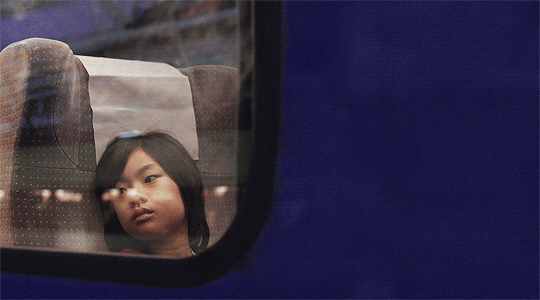
Like many zombie film protagaonists before him, Seok Woo is a father -- a disengaged, overworked father, but one who’s trying his best. But unlike some horror movie kids, his daughter Su-An is more than a victim-in-waiting; she’s the moral centerpiece of the story, an external conscience who serves to gently remind her father of his misplaced priorities and call him on his bullshit.
Fleshing out the rest of the cast are more unlikely heroes: a high school baseball team, a homeless man, a pair of old ladies, and a middle-aged man, Sang-hwa, traveling with his pregnant wife. Sang-hwa is an especially important character, holding up a mirror in some ways to our protagonist: he has a successful, loving marriage where the hero's has failed; he is a doting, patient father where Seok-woo is out of touch.
It is hardly coincidental that this core group of characters is comprised almost exclusively of vulnerable people. And once the zombie disaster strikes, it becomes clear that the job of the less-vulnerable is to step up and protect the most vulnerable, even within a group where no one is especially skilled, heroic, or well-trained to deal with this.
Self-sacrifice is the recurring theme of Train to Busan, delivered with a bludgeoning regularity -- but each death is valorized, the narrative making it clear through its storytelling techniques that these sacrifices are meaningful and heroic.
It’s worth noting, too, that the self-sacrifice that drives the narrative is made necessary by the selfishness of others. Sang-hwa is bitten and stays behind to hold back hordes of zombies only because another group of survivors locked them out of their car.
Those exclusionary survivors -- a group spearheaded by a rich businessman who declares himself early on to be too important to risk his life -- receive their comeuppance soon enough. Here's the clip in all its satisfying glory:
youtube
All of which is not to say that self-sacrifice is not a trope that shows up in other zombie media as well. But I have never seen it the focus of a film with such brazen commitment before.
In Hollywood storytelling, self-sacrifice all too often comes in two flavors. The first: The only righteous path a fatally flawed anti-hero can take. The second: A heroic cop-out, where the character sacrifices him/herself but fails to actually die thanks to unexpected circumstances -- suggesting, thematically, that willingness toward self-sacrifice is all that is required, and that good things come to those who deserve them.
In a lot of zombie media -- and post-apocalyptic media in general -- storylines often flirt with the morality of sacrificing other people for the greater good. Heroes will grapple with the decision, and the one who pulls the trigger may ultimately succumb to guilt or plot karma (Shane and Otis in The Walking Dead, for example), but the discussion is given serious weight and consideration.
Train to Busan makes it clear that such cold calculations aren’t just villainous, they’re cowardly and pathetic.
Other popular zombie tropes that fail to make an appearance in the film include:
A self-appointed leader calling the shots and telling others to get in line
The asshole pragmatist arguing with the self-appointed leader
The untrustworthy outsider and/or villainous mole
The weak or cowardly idiot who gets people killed by virtue of being useless and/or careless
Utterly useless or corrupt government/military/authority
In many zombie stories, man is the real monster, and this holds true in many ways for Train to Busan. But the focus is different. Rather than the monster being the outsider who comes for your supplies, or the stranger who you trust only to be stabbed in the back, the worst humans in Train to Busan are those who act with distrust and selfishness.
Declaring yourself the leader, securing a perimeter, and making a difficult choice to turn away strangers at the gate in order to protect your own group is the action of heroes in a show like The Walking Dead. In Train to Busan, those same actions are villainous and ultimately lead to ruin.
On the flipside, soft-heartedness in American zombie films is often both foolish and disastrous. Consider, for example, Hershel’s barn in Season 2 of The Walking Dead, where walkers are corralled in dangerously high numbers out of an optimistic belief that they can be cured. Just as heroic self-sacrifice becomes a recurring theme in Train to Busan, an endless cycle of trust and betrayal is the signature of The Walking Dead, and the show routinely rewards its moral centerpieces -- like Dale and Hershel -- with deaths that are treated not as valiant but as senselessly tragic.
youtube
But let’s get back to my central thesis. What does any of this have to do with COVID-19?
When South Korea first became aware of the threat of the novel coronavirus, its government immediately launched a response called TRUST: “Transparency, Robust screening and quarantine, Unique but universally applicable testing, Strict control, and Treatment.”
The heart of the program was testing, not just of obviously sick people but of those without symptoms or known exposure -- and then carefully tracing the contacts of those found to have a positive result and isolating anyone who was infected. But the price of this widespread testing goes beyond the monetary needs of dveloping and administering tests; it comes too at the cost of certain freedoms. The South Korean government is able to track down and contain its citizens through credit card records, cellphone data, security cameras and other Orwellian security devices that would make most Americans' skin crawl. Add that to a cultural norm of wearing medical masks in public and obeying social distancing as a matter of course (less casual touch and physical contact, greater personal space) and South Korea’s spread of disease has been quite slow.
Meanwhile, in the USA, people across the country are breaking social distancing rules in order to gather in public and protest the quarantine measures that have left many without jobs and which, some say, infringe upon civil liberties. Mixed messaging about the efficacy of masks, and a long history of masks being associated with crime, have also made it hard to win Americans over to mask-wearing in public -- even though if we could get 100% of people wearing masks, the spread of disease would drop dramatically (and the economy could open sooner).
Countless political, historical, and socioeconomcic factors are at work differentiating these two nations, and the situation is infinitely more complex than any movie. But I do think viewing the coronavirus through the zombie apocalypse lens helps to make sense of these wildly different responses to the disease.
Time and again, America’s zombie media has hammered home certain essential lessons:
When times get hard, you will be called on to step up and take decisive action
Difficult decisions will need to be made, and the people who are too soft-hearted or cowardly to make those decisions will put others at risk
The safety of your own family (or found family) is paramount, and any threat to the family must be immediately destroyed
Survival will be a matter of strength, guns and resources
Institutions like the military, government and police are useless at best and often corrupt or downright murderous; you can trust only in yourself
Viewed in that context, it’s hardly surprising that the United States response to the pandemic has involved hoarding supplies, buying guns, distrusting scientific authorities, and even staging protests.
By comparison, the take-home lessons from Train to Busan are quite different:
No one person is above or more important than anyone else
If you have power, it is your duty to protect those who are more vulnerable
Selfishness invites trouble
Self-sacrifice is heroic and sometimes necessary for the greater good
All of which is not to say that there is no value in the American lessons. There are times when the values of individualism, decisive action, self-sufficiency and suspicion may well be exactly what is needed for survival.
But during a pandemic of a disease that overwhelmingly affects the already-vulnerable -- the elderly, those with disabilities, those living in poverty -- it seems self-evident that values tied to protecting the weak and working together to protect public safety are the values that will prove most successful.
At the end of Train to Busan, the survivors of the ordeal is not the strongest, best-prepared, or cleverest of the people on the train. They are young Su-An and Seong-Kyeong, the film’s most vulnerable characters -- and also its kindest. In an ending reminiscent of Night of the Living Dead, they emerges the sole survivors to face the path of armed military men who at first mistake her for a zombie. But Train to Busan is, for all of its tragedy, a film devoid of cynicism. The soldiers stop just short of shooting when they hear Su-On singing and realize that she’s alive.
In the end, it is quite literally her humanity that saves her.
Living in a time of coronavirus means making self-sacrifices, including personal liberty and livelihood. And while none of our sacrifices are likely to be as dramatic as those made by characters in Train to Busan, they are no less heroic or necessary.
And that is, to me, a lesson worth remembering.
#long post#horror movies#train to busan#the walking dead#zombies#covid 19#horror analysis#film analysis
37 notes
·
View notes
Text
Unorganised thoughts on Trails of Cold Steel I:
So I did like it overall, but I have a lot more criticisms of it than I did of the previous games
Which also means I have way more to say!
Tl;dr - Rean Schwarzer, Estelle Bright you are not
Also, spoiler warning for both this game and the previous ones
So... the pacing in this was weird. Like I loved all the field study segments, they were SO fun, but there’s also the Trista segments between which very boring and felt like filler
I think it’s meant to make the ending feel more important, since you’re defending the school, but it kind of backfired because being forced to run around Thors (which is not a very interestingly designed location, by the way) over and over and over again actually made me kind of resent it. To a point where I low key wanted the ILF to destroy the school. Oops
Like I cared about Liberl and Crossbell because they were interesting, and big, so I never really got tired of them. I got tired of Trista very quickly
Also having everyone in school uniform made their designs less interesting :/
The other places were all super interesting, though! I think if I had to pick a favourite I’d say Bareahard, but they’re all contenders really
Oh also the other issue with the structure was that everyone had to be mad at someone at all times, and it was almost comical how systematic it was - Rean and Alisa don’t get on, that’s resolved, now let’s focus on how Machias and Jusis don’t get on, that’s resolved, IMMEDIATELY we’ll replace that with Fie and Laura, then the moment that’s resolved it’s Jusis and Milliam...
Like, be a little less formulaic in your character conflict
Anyway, characters!
I do not like the thing where the character’s name appears in front of them before they say it. It was irritating
Elliot: The one I would have been in love with when I was eleven. Elliot is good and sweet and did nothing wrong ever. Holy Song is the most useful craft in the whole goddamn game. He also has easily the best S-Craft in a game where most of the S-Crafts are *decidedly* lackluster, aesthetically speaking. I like Elliot. His friendship with Gaius is also very nice
Jusis: The one I would have been in love with when I was fourteen. So, the moment I saw Jusis, my immediate first thought was ‘oh, this guy is one half of a gay ship’. I had no clue who the other guy was going to be, but I knew there was absolutely no way that Anime Draco Malfoy wasn’t getting shipped with a man.
And then Machias opened his mouth, and... every franchise, no matter what, has its gay OTP (its homoTP, if you will) - that one, usually M/M, but sometimes F/F, ship that’s practically got a whole side-fandom just for itself. Up until now, I assumed Trails’ was going to be Olivier/Mueller - but while I haven’t checked, because I don’t want spoilers, I will be shocked if these guys aren’t actually it. They have every making - opposites attract, enemies to lovers, they sing together, other characters make jokes about it...
Like, this was deliberate, surely? Surely?
yes i ship it but like, against my will and resentfully and semi-ironically, because I hate myself for instinctively taking the bait >:(
Something something ‘Turbo-Gehenna’ joke
Anyway, I like Jusis. I think he’s a fun character, easily the most interesting of the boys, and I really enjoyed his development. He has a cute smile
I also thought he had the best voice acting in Class VII, so I looked it up and Ben Diskin! I love Ben Diskin! I couldn’t even tell, I had no idea his range was that great, wow!
I did think it was extremely weird that if you invite him to the Stella Garten, he says he wants to date a woman who is ‘like his mother’. Okay, Jusis.
Machias: The one I would have been in love with when I was seventeen. You ever meet someone who’s like... always right, really, but in such an obnoxious way that you wish they weren’t. Machias. He would have been way more interesting if he was just a really politically minded teen who needed to learn tact, rather than yet another member of the Trails Dead Family Member Club (the fact that it was revealed right after Elliot’s Dead Family Member Club story did not help). Still, he really did grow on me in the end. He’s a little dork
Gaius: The one I would be in love with now, if not for the fact that he’s only seventeen and thus a little baby in my eyes. I do love his design the most. Can he say even one line that’s not about the wind, though? I also like that he’s one of very few characters in this franchise to not have a tragic backstory, was very refreshing.
I can only assume, therefore, that Nord will undergo ethnic cleansing in Cold Steel II
Crow: oh boy Crow hahahahahaha. I don’t know how I feel now. Uhhhh... what did ‘the things I do for love mean’? I am curious
Alisa: I don’t like tsunderes much, and I found her ‘being mad at Rean for something that was absolutely not his fault’ thing very, very stupid and it did not endear me to her at all (also, like, if you had to have that - a better way would have been for him to accidentally injure her, rather than... ugh, look, I am a woman with large breasts - accidents really do happen irl. There’s no point in getting that mad about it. There just isn’t. I have no patience for this kind of plot). It also bothered me how possessive of Rean she got, I swear I picked Towa over her half out of spite. I don’t hate her, though, to be clear - I loved her plot with her mother and that scene in Nord. And her relationship with Ferris! She’s great when she’s not talking about Rean, basically
I don’t buy her as Rean’s love interest, honestly. Rean consistently shows more attraction to Emma, and has more (mandatory/canon) moments with Towa. It only felt one-sided to me
Laura: I like Laura a lot. I don’t really have anything to say about her, just that she was consistently good, and I appreciated her maturity and self awareness, I love her and Rean being sword bros, she’s just great
Fie: I think Fie was designed to appeal to exactly me personally. Tiny snarky badass girl with a great design? That’s everything I love and aspire to be! Best girl in the game (didn’t date her though because she’s fifteen and I refuse to date anyone who is younger than the protagonist when I play games set in high schools. Feels weird enough dating teens the same age as my character. Also she had 0 romantic chemistry with Rean)
Millium: She’s fine, good voice acting, want to know more about Lammy, no strong feelings
Towa: I wasn’t going to date anyone, but changed my mind because I really liked Towa... and then I looked at her, and saw a tiny girl with long, light brown hair and soft voice, and realised I just want to date myself
I checked, and according to Playstation Trophies, at least, she’s the least picked girl? The only characters picked less than her are the non-Crow boys (Machias is the least popular, which... I feel a little mean for finding hilarious lol)
Emma: I like Emma herself just fine. Don’t get me wrong. But she’s infuriating as a mystery character, because she’s the worst kind of mystery - the kind that relies on the other characters to NEVER AT ANY POINT ASK THE QUESTIONS THAT A NORMAL HUMAN WOULD ASK
Estelle would have asked
Rean has multiple opportunities to ask her to explain herself, and he doesn’t! One time, she straight up ASKS HIM TO ASK, and he doesn’t! That’s not mysterious anymore! That’s just incredibly annoying!
Lloyd would have asked
And no one else asks either! Some of them, fine - I can understand say, Elliot or Gaius or Millium - but Jusis!? Jusis, who has been there for pretty much all of her mysterious vague magic, and has repeatedly shown himself to be willing to be kind of rude, and may not be that interested in other people but certainly isn’t stupid - while they’re in the Schoolhouse Depths, Jusis isn’t going to grab Emma by the shoulders and demand she explain what she knows? He’s just going to go with it as she refuses to elaborate on things?
Really?
Kevin would have - actually, no, Kevin would have already known because Kevin Knows All, but he would have told everyone else, so same outcome
Rean: And that brings me to Rean. Rean... is a JRPG Protagonist. He is good, and noble, and he gives Inspiring Speeches, and he can date all the girls (which means we don’t really get any interesting opposite-gender friendships, because oh no, a threat to the harem!), and he is so, so boring. My god
Hey remember how I praised Sky for how great it was to have Estelle be an actual person with flaws and personality? No you don’t, no one’s reading all of these, but yeah - Estelle is just as colourful and full of life as the rest of Sky, while Rean is the least interesting character in Cold Steel no contest
Oh he has a super powered dark side, oh, well, that’s a game changer, never seen that before except in every 2000s shounen anime. Also we never actually learn the Super Rean rules, so that dramatic moment where he’s thinking about transforming to fight Scarlet isn’t actually that dramatic because I had never realised it could kill him until he said so in that moment
Oh except he’s also an awakener and can summon a Persona giant mecha suit! Because he’s the most special boy to be very special? I have never seen that in a JRPG before except in all of them
In Sky, Estelle wasn’t special. Except she was, but it wasn’t because she had super awesome secret awesome powers and all the boys liked her best. It was because she was flawed, but always trying, and because she was incredibly brave and optimistic no matter what, and because she was the kind of person who told a god summoning evil mastermind ‘lol no’ and then beat him with a stick, and because she really, believably loved her friends. She loved them. And they loved her. Not the player she was the avatar of. Estelle herself
Estelle Bright has ruined me for all other JRPG protagonists, is what I’m saying
Oh also Rean has that whole speech about how they can’t cancel the festival to protect people from an unknown threat, that’s not fair to meeeeee, and as someone who has lived through the year 2020 - go to Gehenna, Rean
Olivier is back!!! And yeah I’m going to keep calling him that, that’s who I know him as, and also Olivert is a silly name
Even more importantly, Mueller is back!!! And he and Olivier still have the best comedy dynamic in the series, joyous day! THAT is love and peace, baby!
Sara really, really grew on me :) I want to see her interact with Schera so bad
I didn’t really like Sharon up until I worked out OH SHE’S OUROBOROS, because yessssss more of them! Also, yessss, guessed it!
Angie... predatory lesbian stereotype aside, Angie’s super interesting and I want to see more of her yes please
George is like, the most inoffensive character I’ve ever seen, but apparently he has haters? What!?
What is with these games and naming characters/things French words, and then PRONOUNCING THEM WRONG
I do not care that the official pronunciation is ‘Blue Blanc’. I will continue to pronounce it ‘Bleu Blanc’. Because that’s what you guys actually wrote, Christ alive
I have a French GCSE and I will use it for something, goddamnit
I took Jusis on the bike trip and he looked so adorably goofy in the little sidecar. Best moment of the whole damn game for me
I’m trying to imagine what it would be like to have played this game first, as I know a lot of people did. Specifically in regards to Olivier (or Olivert, I guess)
Like... imagine meeting this guy for the first time as a fairly serious leader of an important faction, participating in vital political machinations. Imagine meeting him here and not knowing about the Grand Chardonnay incident. Imagine not knowing about that time he stopped a riot by riding up in a boat and singing. Imagine not knowing he has a rivalry of aesthetics with a terrorist. Imagine not knowing what I was referring to when I said ‘that’s love and peace, baby’ just now
Incomprehensible
Side note, if you had told me, on one of those warm August days when I was first playing Sky FC, that the silly man in the white coat was actually one of the most important characters in the franchise, I would not have believed you for a second
But on that subject, I was also trying to work out who a first time player would be siding with... like, I’ve played Sky and experienced Zero (currently working way through Azure as well), which means that my immediate reaction to all of Erebonia’s politics was ‘trust whatever Olivier and the bracers say, don’t trust anyone else’. But someone starting with Cold Steel has no reason to have loyalties to those factions, so I’m curious
Side note, having played the previous games also massively impacted how I viewed the ILF - I’m very confident that I would have just taken them being evil for granted if I’d played this first, but considering they hate Osbourne... and Olivier does not like Osbourne... that kind of made me a lot more suspicious of who I was really meant to side with
I really liked most of the NPCs in this. I especially became weirdly fond of Beryl
However, I do now also have characters I actively dislike, a series first! Gwyn (creepy old man), Neithardt (sexist jerk, kick his arse Beatrix), and Dorothee (...could write a whole essay on the myriad reasons I do not like that particular archetype) get in the bin
Good god, every interaction between Rean, Emma and Dorothee made me want to smack the lot of them with my controller, Dorothee for being an absolute creep, and Rean and Emma for overcorrecting into low key homophobia (seriously Rean, you’re friends with a lesbian, the idea of the existence of gay men should not shock you this much)
Re: Elise... I heard the words ‘non-blood related younger sister’ and my eyes rolled so far back in my head I was afraid they wouldn’t come back down
Took me a while to figure out, but ideal team is Elliot, Jusis, Machias, with Laura and Fie as back-up
I would like to find whoever’s idea it was to make the S-Crafts unlock as the game progresses rather than just be there when you get the character, and shake them until they apologise. Have them evolve with the story, sure, but not having them at all wrecks the battle flow so much. Emma was unusable to me until chapter-goddamn-FIVE
I loved the Annabelle subplot, and the punchline that the person her family wanted to marry her off to was a Lakelord... I actually yelled
The concert was so hyped, and then there weren’t even any real songs (aside from the re-use of the end credit song from Sky, which made me very happy. And Olivier singing along made me laugh out loud)
TOVAL IS TOBY!?!?!
Man I’m so mad at myself for not reading Carnelia in/after FC (read it in 3rd), but still - what a reveal!
AND WHAT AN ENDING
I mean. At first
They did such a good job building the tension, and then-
The Crow twist, my GOD, when I tell you I freaked the fuck out... I was totally convinced that it was Claire. Or possibly Campanella on stilts. I completely overlooked that there was another major character with a C name, and honestly I’m glad I did because I have not been this shocked by a reveal in a while
And then I stopped taking it seriously when I saw the robots with heelys
It was all.. we had a very final boss-y final boss, right? Excellent final boss fight, very fun, very satisfying. And then the game just... kept going. I accidentally stayed up until 4 AM because I thought I was at the end and it just didn’t stop
And then it did. Very, very abruptly
(no seriously I was making some snarky comment about how goofy the flying robot suits look and then the game just ENDED, what)
(also worst *actual* final boss I’ve ever seen. the fact that they managed to make a battle between two giant robots, one of which was controlled by a traitorous former friend, feel like an anticlimax... that was impressive, honestly)
So Cold Steel I is... easily my least favourite Trails game so far. Again, I did like it, but like I say... Rean isn’t Estelle Bright. And that’s pretty much my main problem, in the end
Sorry, Class VII
OH MY GOD they never explained why it’s Class VII and not Class VI! My theory is that it’s either something about the Sept-Terrions, or the Seventh Division, since Olivier’s specifically connected to them. Or maybe both
Well - I’m excited to find out!
4 notes
·
View notes
Link
Near the end of Betrayal—or near the beginning of the betrayal within Betrayal, since Harold Pinter’s 1978 play about a seven-year affair runs in reverse, from the infidelity’s aftermath to its inception—a soused would-be lover rattles on a bit.: “Look at the way you’re looking at me. I can’t wait for you, I’m bowled over, I’m totally knocked out, you dazzle me … My life is in your hands, that’s what you’re banishing me to, a state of catatonia, do you know the State of Catatonia? Do you? Do you? The state of … where the reigning prince is the prince of emptiness, the prince of absence, the prince of desolation. I love you.”
In the royal family of Western drama, Pinter himself might be exactly the figure his intoxicated, infatuated character describes. His laconic, subtly brutal plays—known for the loaded pauses that now bear the writer’s adjectivized name—float precariously on a dark reservoir of things unsaid. His characters are like those waterbugs who balance above the depths on the delicate force of surface tension. He is not a universal taste, and mediocre Pinter productions have their own particular kind of cringiness: They feel like acting exercises. Even in sure-footed ventures into the Pinterverse—such as Jamie Lloyd’s lean and sexy revival starring Tom Hiddleston, now visiting New York after its London premiere—there can be an element of technical gloss to contend with. You can feel, as I did, like you’re watching Good Actors Acting Well, which is a matter of intellect rather than emotion. Impressive and interesting, yes. Devastating? (Pause.) Well.
Lloyd’s production is cool, confident, and mercifully aware of Pinter��s sense of humor. Some of its strongest moments are its unsmiling jokes, which Lloyd’s actors attack like fencers, pricking without overextending. Hiddleston—with his fixed blue stare and his ability to lock his jaw into a mask of British propriety, unmistakably undergirded with menace—is particularly adept with the playwright’s distinctive rhythms, his smirks, evasions, and threats. A vapid conversation between Hiddleston’s character, Robert, and his best friend Jerry (Charlie Cox) about whether boy babies are “more anxious” than girl babies becomes a master class in hard-edged, straight-faced comedy. But then the whole play has that “master class” feel to it: As much as the phrase has become a critical cliché for a tour de force, it’s not the same thing as “masterpiece.” There’s expertise on display, but there’s an academic distance to it too.
Part of the distancing effect might be that Hiddleston undoubtedly outshines his fellow actors, who are solid (and equally great-looking — this is Pinter with highly paid personal trainers) but never quite as at home in the material. Cox comes close, and indeed, his role gives him less of an ability to stand still and shoot lasers from his eyes, as Robert gets to. He has to maneuver, stumble, and course-correct more, and he does so with a bemused, affable charm that belies a deeply selfish character. Part of Betrayal’s fascination is that Jerry, who’s been having a hidden affair with Robert’s wife Emma (Zawe Ashton) for seven years, is in fact the “Pinter” role. From 1962 to 1969, Pinter himself concealed from his wife an affair with the BBC presenter Joan Bakewell (for her highly compelling take on their now immortalized-if-somewhat-fictionalized infidelity, click here). It’s arguable, though, that for all the playwright’s own experience inside a dangerous liaison, his play belongs not to the betrayers but to the betrayed. At least in Lloyd’s production, Robert—his moment of awakening and his eventual hardening of himself as a result—is the heart of the show.
It’s structural—the torturous scene in which Emma admits the affair to Robert sits smack-dab in the middle of the play—but it’s also a matter of actor and director inclination. As Robert slowly learns the truth about Jerry and Emma, Hiddleston sits stone still and silently weeps until the snot hangs in ropes from his nose. There were quiet gasps in my audience when it started to drip, unheeded by this broken man in his moment of crisis. “Ah. Yes. I thought it might be something like that, something along those lines,” says Robert, with extreme Britishness, when Emma confesses — but there’s so much raw emotion pulsing underneath Hiddleston’s performance, and overflowing its container in this one pivotal scene, that the character can’t help but become the play’s tragic center. The way Hiddleston plays Robert, it’s difficult to believe it when Emma tells Jerry, “You know what I found out… last night? He’s betrayed me for years. He’s had… other women for years.”
Despite the real power of Hiddleston’s performance, that empathy gap strikes me as a flaw. We can’t quite take Emma at her word (we’ve also heard her lie on other important matters), and so the scales of Lloyd’s play end up tipped rather than balanced. It seems to be a play about a victim and two perpetrators — but I think it’s a play about three people, all of whom we should empathize with, all of whom we should mistrust, all of whom are capable of great selfishness. Ashton has the hardest job: Emma’s got that sense of mystery about her that sometimes happens when men, even very talented men, write women. The scenes between Robert and Jerry, though often tense and terse, feel lived, red-blooded, affectionate. Emma often seems ethereal — her motivations and actual desires somehow far away. (For a real bust-up of that trope, get into Bakewell’s essay — there’s no mystery woman there; instead there’s a super-smart Cambridge grad who was expected to become a housewife and mother at 25.) The character is already the most opaque in the play, and Ashton’s performance doesn’t do much to elucidate her. Tall and willowy, with bare feet and a dancer’s limbs, she tucks her hair behind her ears, tilts her head and half smiles. It’s clear she likes Jerry’s attention, but it’s not clear where her own deep hungers lie. Lloyd has her leaning into the enigmatic aura Pinter gave Emma, and it renders Ashton less visceral and—and this is the real problem—less sympathetic than her male counterparts.
Still, Lloyd’s stripped-to-the-bone approach to the play’s environment lets the text breathe and stretch. We can really hear Pinter’s words pinging off the big blank wall of Soutra Gilmour’s set, with its neutral palette and vast, clean emptiness that put us in mind of the art gallery where Emma works. In this white box, the three actors move like dark ghosts, memories of themselves with all the clutter stripped away. They turn slowly on a big revolve, and, crucially, Lloyd keeps all three present throughout, so that the shadow presence of the third always influences scenes between the other two. The staging restores some of the balance that’s lost in the performances. It brings back the sense that any affair, especially one that involves friends, is in fact a triangle, and that out at the corners of such a hard, angular form, even in our desperate flight from loneliness, we’re more isolated than ever.
Betrayal is at the Jacobs Theatre.
65 notes
·
View notes
Text
Welcome to Everworld
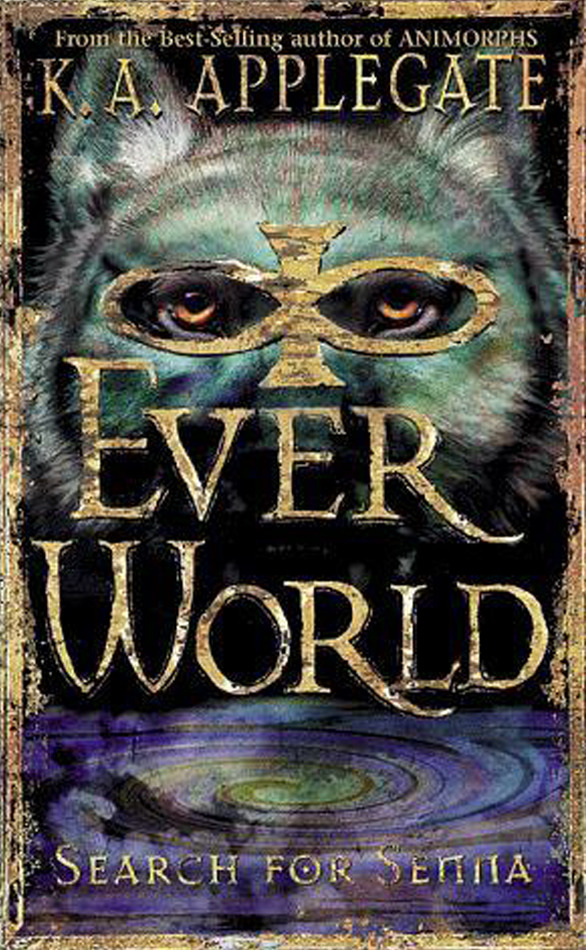
If you were a kid in the '90's, chances are you crossed paths with the book series Animorphs in some way. Written by K.A. Applegate and Michael Grant, this sci-fi/action epic about kids turning into animals to fight off an alien invasion was one of the Scholastic Corporation's most popular IP's of that decade, rivaled only by Goosebumps. It had sixty-four books, numerous video games and toy lines, a TV show that ran for two seasons on Nickelodeon, and even cross promotions with fast food chains like Taco Bell and Pizza Hut that sold Animorphs collectibles with their kids' meals. An official graphic novel adaptation is now in the works, and the series still has a devout fanbase.
And rightly so. I started reading Animorphs at age nine, and to this day, it's easily one of the most powerful and formative works of literature that I've ever read. It was funny but tragic, relatable but imaginative, entertaining but horrific, and it often hit you with a sobering dose of reality that made the message of each book stay with you long after you finished reading. Best of all, its mature themes and ideas about the morality of war have made it just as meaningful and relevant to read as an adult as it did as a kid, so I highly recommend the series.
With that said, I want to discuss another book series that Applegate and Grant wrote during that same time called Everworld.
I occasionally saw ads for this series in the backs of the Animorphs books (exactly four of them), but the ads were always vague, and eventually those back pages were used to advertise other things. A promotional CD called The Everworld Experience was given out in bookstores upon the third Everworld book's release, but if the series was ever sold in Scholastic's monthly school catalogues or at any of its school book fairs, I can't find evidence of that. Botton line, it barely had any of the exposure or success that Animorphs did, and the series came to an earlier-than-planned conclusion after two years and twelve books.
This is a real shame, because now that I've finally sat down and read all of Everworld, I think the series is great. It deals with four Chicago teens (David, Christopher, April, and Jalil) who are dragged by a witch named Senna to a parallel world where the gods, monsters, and famous figures from all of Earth's mythologies live at constant odds with each other. The teens exist in this place, called Everworld, and on Earth simultaneously, with their consciousnesses jumping back and forth from one world to the other whenever they go to sleep. In addition to staying alive, their main goals in Everworld are to save it from an invading alien god named Ka Anor and to keep Senna from transporting more dangerous people to—and from—Earth.
I should start by saying that Everworld was written for an older audience than Animorphs; for high schoolers instead of middle schoolers. As a result, it has a much darker and grittier tone with less, shall we say, innocent protagonists. It shares a few themes with Animorphs, such as the stress of leading a secret double-life and having to compromise personal values for the greater good, but it also deals with themes like letting go of old perceptions as you grow up, realizing the cost of your deepest desires, and deciding whether to keep to the safe life you know or venture into a greater unknown.
Everworld's premise is clearly a metaphor for coming of age, a representation of the crossroads between childhood and adulthood where you need to start finding a direction for your life. For all of its fantastic settings and elements, the series is really about the four main characters' internal conflicts, not the external conflict around them. The external conflict is just a device that serves to make the characters deal with their internal conflicts, and this is important to keep in mind when reading the series. We don't see much of how the teens change Everworld by getting involved in its dealings, just how much deciding to get involved changes them.
As for the characters themselves, I think we're given a pretty well-rounded and relatable main cast. We have David, the self-appointed leader who feels unfulfilled in his normal life and is desperate to prove his worth due to his toxic masculine upbringing; Christopher, the less-than-sensitive class clown who leans on immature humor and sitcoms to cope with his problems; April, the wily, religious idealist who takes care of business when she needs to; and Jalil, the level-headed skeptic who tries to learn the science of everything so he can master it. A huge part of the overarching conflict is these four learning to get along and work together, and once that starts to happen, they become a fun group of friends to go through all of these crazy adventures with.
I've read complaints that some of their early character flaws (especially Christopher's tendencies towards xenophobic humor) turn off a lot of readers after the first few books. That's understandable, but the point of giving the characters those flaws is that they eventually see the error of their ways and reform. I don't approve of Christopher's intial brand of humor, but I actually like him the most out of the four because he undergoes the biggest and most dramatic transformation throughout the series. You see how finding a life goal in a world where he can't tune out reality so easily makes him a better person.
The other major character is Senna the witch, who really serves as the main antagonist of the series. Not that she's a villain; a major part of the story is trying to figure out her motives and allegiances, since she seems to help the four leads as often as she gets them in trouble. We even get a book narrated by her eventually, and that does a great job of swaying you to feel one way about her right before the series yanks you in the other direction. She's not as complicated as Snape from Harry Potter or Gollum from Lord of the Rings (even though she does shape-shift into him in one rather amusing scene) but I found her arc just as engrossing and its conclusion extremely rewarding. The whole series is worth reading just to get that rush at the end.
And that level of engagement is the ultimate reason why I recommend Everworld. It's one of the most immersive works I've read in a while, both in setting and tone. It takes you right back to the '90's from Page 1 with its now-nostalgic pop culture references and laid-back view of the world, and then it slowly pokes at that bubble with an ominous undertone until all hell finally breaks loose. The descriptions of Everworld effectively capture the feel of every location and threat, and Applegate and Grant's tongue-in-cheek humor goes a long way in keeping the series self-aware enough to avoid turning hokey. One of my favorite parts is in Book 4 when the teens try to catch a wild boar for food, only to have it beat them up and then suddenly order them in English to give it what little food they do have. It becomes a running joke after incidents like this for David, Christopher, April, and Jalil to mumble, "W.T.E. Welcome to Everworld," and then move on with their business.
Also, borrowing so many of its settings and characters from preexisting mythologies (with the authors' own creative twists, of course) builds anticipation as you wonder what other pantheons the series might explore as it goes on. It also gives the protagonists some prior knowledge going into each conflict, especially when some of them start using their "visits" back to Earth to research mythology. This helps endear them to readers by showing their proactive sides, as well as their overarching growth throughout the series as they start trying to help Everworld instead of escape from it.
What's interesting though is that the scenes on Earth are also very descriptive and immersive. It's easy in cross-world narratives like this for the "real world" to take a back seat to the more creative fantasy world, but the Earth scenes in Everworld have their own overarching story that also builds into a genuinely suspenseful conflict. This really sells the idea that David, Christopher, April, and Jalil still have some grounding in their normal lives that keeps holding them back from fully embracing their new lives in Everworld.
With that said, I do wish that their families had more of a presence in the series. The families in Animorphs were very well defined and prominent in a lot of the B-plots of some books. This made us like them almost as much as the Animorphs themselves by the end of the series, which raised the stakes tremendously whenever things started to escalate. In Everworld, we see the families occasionally but get very little sense of their personalities or the teens' relationships with them.
I don't think either of David's parents ever makes an appearance throughout the whole series, and I actually forgot for a while if Jalil's mother was even alive until he mentions her in one of the other characters' books. Things like this make it hard to feel the full emotional weight of certain events near the end of the series. I guess the idea is that teenagers going through major life changes like these just aren't always that close to their families, but it still feels like this particular element of the story could have had a little more focus to sell how torn the characters are between their two lives.
It's worth noting that Christopher's parents and brother probably get the most character out of all the families, with scenes as early as the second book showing their interests and personalities as they banter with him. Given his similarities to Marco, the main comedic character from Animorphs, I'm starting to think Christopher was the authors' favorite lead as well.
Also, one of the Earth antagonists in Everworld is named Mr. Trent. This was also the human alias of the main villain on the Animorphs TV show, which predates Everworld. I can't find any information on how both of these characters came to have the same name, as Applegate and Grant didn't write the TV show, but it certainly has me conjuring all kinds of theories about the two book series existing in the same universe.
So why wasn't Everworld more successful if it's so good? Why didn't Scholastic advertise the hell out of it to at least try and hook the millions of Animorphs fans back then?
Sadly, I think the answer lies in the reader demographics. When you're dealing with kids, a couple of years can mean a huge difference in maturity and what's considered appropriate material for them. Animorphs was surprisingly graphic and intense for a children's book series, but it was still written for children. I can't recall a single swear word ever being said in it, and things like drugs, sex, and xenophobia were either very vaguely implied, disguised in metaphors, or presented as problems that the alien characters (not the humans) struggle with.
The very first Everworld book features flashbacks where David recalls seeing a camp counselor molest a child and hearing a football coach call a player the "F" word for not being tough enough on the field—and they don't just say "the 'F' word" in the book either. Add a few dollops of religion, sexuality, infidelity, teen alcoholism, and other adult language throughout each book, and there was no way Scholastic could promote this series to the same kids who read Animorphs. The Everworld books don't even have that bright red Scholastic logo at the bottoms of their covers; there's just a tiny, inconspicuous logo on the spine and an even less conspicuous trademark credit on the back.
Again, I can't currently find any information about this. I'm very curious to know how this situation came to be though. Did Scholastic give the authors more leeway for Everworld because of Animorphs' success and then found out too late how far the pair had run with that? Did the company want to experiment with publishing more adult material but then started getting cold feet closer to Everworld's release?
The worst part of this, if it's true, is that Scholastic may have been right to worry. According to some of the YouTube comments and online book reviews I've read, a lot of kids who read Animorphs in the '90's were barred by their parents from reading Everworld. Some say their parents found the series too dark and inappropriate. Some say their parents took issue with it for religious reasons, due to all the pagan deities that it shows to exist. One person even said they were almost barred from Animorphs too after their parents vetoed Everworld. Not the kind of thing a Scholastic executive in 1999 would have wanted to hear.
I know that Scholastic would go on to publish the Harry Potter and Hunger Games series over the next decade, and both of those saw their share of controversy too. All things considered though, I do side a little with the parents when it comes to Everworld. The topics that I listed three paragraphs ago are important for teens to discuss, and it's realistic to include them in a story about teens, but I feel like the series presents them a little too bluntly for me to totally disagree with the parental discretion. There's an entire book about a lustful underworld goddess who does nothing but capture men and force them to "please" her under threat of castration, and there's an ongoing subplot where April questions what the existence of all the different pagan deities in Everworld means for her own Catholic beliefs. Even if this series had come out today, there would be a legitimate reason for the concerns.
I'll never say to bar your kids from reading anything, but here's a thing to consider: the main characters in Animorphs are roughly thirteen years old at the start of the series, they're sixteen by the last book, and the Everworld characters are sixteen throughout their series. Maybe letting your kids read Animorphs first and giving them a chance to mature alongside those characters is a good gauge for when you think they'd be old enough to read Everworld.
And if they decide for themselves that they don't want to read Everworld, then that's them choosing a direction in life, just like the series would want them to make.
~
#ka applegate#michael grant#everworld#animorphs#book series#scholastic#young adult#scifi#fantasy#david#christopher#april#jalil#senna#gods#goddesses#mythology#loki#ka anor
2 notes
·
View notes
Text
Talks Machina Highlights - Critical Role C2E27 (July 24, 2018)
This is a special SDCC edition featuring the cast... some of the cast! Marisha Ray, Taliesin Jaffe, Sam Riegel, Liam O’Brien, and Matt Mercer!
This episode was pre-recorded on Saturday, and hence there is a tragic lack of After Dark content. Please turn off all your lights after the episode airs to simulate the After Dark experience. Thank you.
Vox Machina: Origins will be back in 2019! The next arc (the first arc to really kick in for the home game) will be about meeting Pike and Percy.
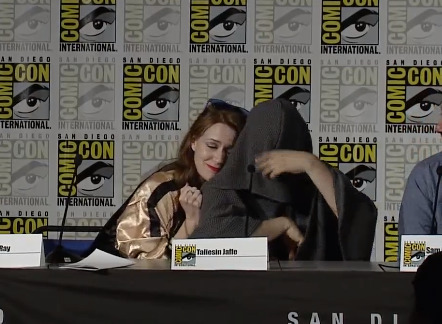
Matt is going to have Taliesin design him a Mollymauk tattoo. Sam: “Does Taliesin get to pick the body part?” Marisha: “No, I do.” Taliesin: “We’re in committee.”
Realizing how much the dynamic was going to change has thrown everyone a bit off-balance. Liam’s glad Keg stepped up when she did after Molly went down. Caleb’s mental process was “How many can we save?” and knowing he’d have to just cut and run if he couldn’t bring anyone with him. He was very aware of the Scroll of Invisibility in the pocket.
An older game of Matt’s where Taliesin played had only two out of five characters survive after a disastrous fight. That session was Marisha’s first time watching the game after she and Matt started dating.
Leaving the coat was mostly a respect thing since it was such an intrinsic part of Molly’s character. It is pointed out that they might come across a bandit mugging people in that coat. Anyone who stole that coat would just be liquified. Liam points out that if Lucien/Nonagon/whoever returns as an NPC Big Bad of the series, leaving the coat might keep them on their good side.
Beau has a family history with tarot cards, which is why she always had a thing about them. The last meaningful conversation she had with Molly was over those cards. Taliesin: “I was watching, going, ‘Yeah.’” Marisha: “It means something, and Beau has some regrets about how that conversation went.”
Nott didn’t want anything? “Of course I wanted things. I wanted everything.” But it didn’t seem respectful. Taliesin: “I was backstage screaming, ‘LOOT THE BODY, just loot the body, what’s wrong with you!’”
Taliesin had several moments last episode where he had to drop everything and get ready to go when his new character almost made an appearance... but never quite did.
Taliesin’s opinion of the funeral? “I feel like more money could’ve been spent. I mean, you ended up in a brothel. You could’ve done something.” Seriously, though, he cried. To Marisha: “You were a lot.”
Sam’s getting to the point where Nott’s point of view is like second nature. “It helps that I have had a lot of drinks in the past, and I know just from sense memory what that’s like.” Liam: “Nott shares your unbridled sense of id, Sam.”
According to Matt, the hardest part about preparing for the new campaign was creating something that simultaneously felt new and set itself apart from the first campaign without deviating too dramatically. He also felt like if the first episode was a dud coming off of the very dramatic ending of campaign 1, that would be on him. He was very aware that a lot of people would be jumping into the show for the first time since it would be a more accessible entry point.
There will be one shots and all sorts of new content associated with the new studio. Honey Heist 2: Electric Bear-galoo will be the first one! Marisha wants to start and focus with bite-sized content, shows that will lower some of the barriers of entry to D&D. A lot of people have discovered D&D from CR and want to get into it, but the PHB looks like homework, so they’re trying to make elements of it more easily understandable to a wider audience.
Matt likes to bring in guest stars, but doesn’t want to do it too often so that the story still focuses on the Mighty Nein. He’s excited to have this opportunity to bring in more of the folks they’ve wanted to have for ages, though. There’s always the possibility of guests having to cancel last-minute, which makes the whole process nerve-wracking. The focus is always on bringing in the people who only really want to be there for that part of the story.
Matt on dealing with directed anger from the internet: “Whenever somebody lashes out, it’s coming from a place of insecurity inside them. Most people. Some people are just dicks. But some people are just angry at the world and lash out at whatever’s in front of them.”
Matt on non-binary NPCs: “There’s plenty more out there.”
Mechanics they miss from last campaign: Marisha went from being “a versatile Swiss-Army-Knife toolbox to a... toolbox.” She misses the versatility of the spells. “Now I try to figure out other creative ways to do things.” Taliesin: “I miss having an enormous amount of distance from combat.” Sam: “The ability to speak. With confidence. That’s it.” Liam: “I miss the sheer satisfaction, and dare I say smugness, of stealth rolls.”
Taliesin on Molly as queer rep: “I love watching what’s been happening with the community in the last 15 years.” He had to ask his “young friends” to figure out the vocabulary, but he’s been focused on exploring new things and he’s delighted at how much it’s resonated with people.
Taliesin on Molly: “He’s still doing great in my head.” Matt points out that Molly’s already having major effects on the campaign and the motivations of the PCs right now (Taliesin’s so pleased).
Marisha: “After the first few times that I put the moves on [Yasha], we were at break, and I could sense that Ashley was wanting to ask me something, and she got up the courage, and she was like, ‘Hey, um, I’m just curious. Is Beau--’ and at that exact moment someone called Ashley to the stage, and I was like, ‘Bye!’“ They haven’t had a chance to talk about it since then. Beau’s looking at it a bit like deciding whether or not to get into a work relationship right now.
An unexpected theme of campaign 2 has been identity and trust. Matt on one of his favorite unexpected storytelling developments: “Having a group of self-entitled terrible people that had this one amazing individual come into their life and be taken away, and now realize they all want to become better people because of that.”
Sam mentions that the first year in the home game, the characters were a bit like cartoon characters, until they got comfortable enough to start letting them have real emotions. Now there’s been a lot more pressure to create a character that’s internally consistent and different from their first characters without being too different and outside their ranges.

Liam gets a question from a kid with the cutest voice and everyone loses it from the adorableness. What’s his favorite monster? “Well, my number one favorite monster is Matthew Mercer.” He’s a big fan of the beholder. “I really like that guy.”
Sam on being asked how he creates flawed characters: “I’m fascinated by flaws and how people overcome them and work around them and stuff, because in real life, I don’t have any.” For Nott, he picked a couple of weird character quirks and worked backwards from there. “The ‘why’ is the fun stuff.”
Matt talks about how we’re already facing a huge difficulty with prejudice in the world now, and he doesn’t feel like he should be forcing that awfulness into entertainment. He’s still finding the balance to give the players a chance to confront and defeat those ideas without it feeling hackneyed or unnecessarily painful to viewers dealing with those issues outside the game.
On resurrecting Molly, Taliesin: “Due to things I can’t necessarily go into, I don’t know if that would have even worked.”
Liam talks about how he never plays Renegade characters in video games and how it’s been a challenge playing Caleb. Liam: “The Mighty Nein isn’t really the family that Vox Machina was, at least not yet, but we are. We love each other and we love playing with each other.”
Marisha points out that when Molly talked about a silk flower, he said, “Here’s one that won’t die.”
2K notes
·
View notes
Text
My thoughts on “The Rise of Skywalker”
I just saw The Rise of Skywalker with my friend @ewoking-on-sunshine. I’m still processing it, but I have many thoughts. Spoilers below the cut.
It’s not a perfect movie. But I enjoyed it and am, for the most part, satisfied. All I wanted was for it to be enjoyable and make sense and bring some resolution to the story. I think it succeeded overall.
I feel like I can’t complain too much, because the biggest things I wanted to happen did happen: we got Ben’s redemption, a freaking Reylo kiss, and Ben smiling. We even got beautiful things I wasn’t expecting, like Han’s scene, and the revelation that Leia trained as a Jedi for a time. I think it can stand on its own as a story in itself, though The Last Jedi may remain my favorite installment as far as story craft.
Here are my miscellaneous thoughts and opinions:
~ Much of it feels like fan fiction. Whether that is good or bad, I’m not sure. It could just be that the fans were particularly good at predicting possible developments and the general direction of the story.
~ Nothing was revealed about Kylo’s style/method of governing, or whether he did anything to expand the First Order’s power as Rey predicted they would do in TLJ
~ Palpatine’s return could have been set up better
~ The symbolism and significance of Kylo killing his abuser is changed, if not completely ruined, since Snoke was Palpatine’s puppet, and Kylo seems to enter Palpatine’s service after learning that he was the one who manipulated him throughout his life. Maybe Kylo thought if he refused he wouldn’t be able to get away alive?
~ Palpatine’s plans are as confusing as ever. Just how much he controlled, what he was aware of, and what his true intentions were is unclear. In particular, I’m confused about the fact that Palpatine made Snoke, who seemed ignorant of Rey’s origins and told Kylo to kill her, and the fact that Palpatine told Kylo to kill Rey when it turned out he wanted her to come and kill him. Were Snoke and/or Palpatine using reverse psychology in giving Kylo those orders?
~ Palpatine probably had the means to prolong and/or restore Padme’s life the whole time Vader was trying to find a way to do so
~ It is unclear whether Rey ever told anyone about her bond with Kylo or how he killed Snoke (which is pretty relevant information for the Resistance).
~ It’s unclear whether Rey and Kyko have seen or felt each other through the Force at all in the past year. Each movie shows several Force bond connections in a short period of time (one or two days each), and that would add up to a lot in a year, so I’m guessing they didn’t have any for that interim. It seems that although Rey closed the door, Kylo opens it. I don’t really like what that implies.
~ The beginning revealed so much and moved from one set of characters to another so quickly that I wondered whether the story was going to continue following the hero/heroine’s journey(s). Eventually it did, but it felt like the strangest beginning for a Star Wars movie, especially compared to the brilliant opening sequence of The Force Awakens.
~ Rey and Poe’s bickering was fun to watch
~ They did pretty well using those bits of Carrie Fisher footage and making Leia’s death play a role in the story. I’m sure if Fisher were still alive they would have had more justice for Leia.
~ I wish Rose had played a bigger part in the story, and that her relationships with other characters had been clarified and explored more.
~ I wish Ben had interacted with other members of the Resistance. He and Finn had so many parallels in their arcs, and the two of them actually had a couple scenes together, but they were always distant, with Finn watching as Rey interacted with Ben.
~ What was Finn going to tell Rey? What was their relationship about when it came down to it? They had such a wonderful dynamic and intertwined arcs in The Force Awakens, but in this installment it felt like they were running parallel to each other.
~ Giving Poe a shady past as a spice smuggler contradicts his canon backstory revealed in Before the Awakening by Greg Rucka.
~ Hux’s death was disappointingly anticlimactic. Seemed like a waste of his character. I’m not sure how I feel about the twist of him being the spy. He seemed so much less the crazed man who fired Starkiller or the calculating menace who considered killing an unconscious Kylo. Before TROS, Hux’s motivations seemed more political and ideological, a contrast to Kylo’s motives which seemed personal.
~ In what capacity did Pryce serve Palpatine in the previous war?
~ The fact that Rey is a Palpatine raises all kinds of questions about her family. There could be a whole trilogy about what kind of relationship Sheev and his child had. I wonder if the mother of his child was Mara Jade or someone like her who worked closely with him. But the mention of cloning and other strange techniques for making or passing on life makes me wonder if his child was even “natural” or somehow made.
~ Rey’s Dark Side heritage makes her affinity with the light side even more ironic and miraculous. Or maybe the irony is that someone as dark as Palpatine could come from such an idyllic utopia as Naboo. Maybe they are trying to show that it is our choices, not our origins, that define us.
~ The fact that Rey is descended from a powerful established character takes away from the idea that Rey represented for me and many others, that a great person can come from humble, unimportant origins.
~ Finn’s arc was opposite of predicted stormtrooper rebellion. The stormtrooper paradox still holds.
~ The hunt for Sith clues doesn’t make sense. It makes even less sense than the search for Luke in TFA, which was full of holes and unexplained coincidences.
~ The way Ben stands on the Death Star looking out at the horizon was 100% Byronic hero, but also similar to Luke’s posture when looking at the Tatooine suns.
~ Seeing Kylo talking to Han and Rey talking to Luke underscored how Kylo and Rey are co-protagonists.
~ How long did Ben stay at the Death Star ruins contemplating his and Rey’s situation? Apparently long enough for Rey to go to Ahch-To, talk to Luke, and go to Exegol, because he arrives there later than her. Time and distance in these movies have never made much sense, but I wonder if there might be some deleted scenes involving Kylo at this point. Did he realize he had lost control of the First Order? Did he ever think about ordering them not to follow Palpatine?
~ Regarding minor pilot characters: Happy to see Wedge Antilles back, sad to see Snap Wexley die.
~ Poe could have had better resolution for his arc as an emerging leader
~ Finn tries once again to sacrifice himself despite what Rose said to him after he tried to do that in TLJ. (While I don’t think it was necessary, Ben’s death was in keeping with her words because he died to save what he loved.)
~ We finally got a Reylo music theme! If I’m not mistaken, it had the Force theme sort of underlying it but there were other things going on too. I look forward to hearing the What the Force podcast’s discussion on this.
~ Rose was right that they would win by “Not fighting what we hate. Saving what we love.” Rey refused to even hate Palpatine. Ben came to save Rey and that enabled her to save everyone else.
~ My favorite moments of each sequel involve Rey, Ben, and a light saber passing between them.
~ Everything that was said to Rey and Ben about home, family, coming home, coming back ... it was all leading up to their teaming up. Palpatine was wrong when he said he was Rey’s only family. Ben became her family, and that was part of the reason why she took his family name. Whoever wrote the caption “The belonging you seek is in Ben Solo’s arms” was right.
~ We still don’t know what, if any, ideology Ben held, how he felt about political power and different forms of government. That pretty much reinforces my belief that for him this has never been about politics, it’s all been personal for him.
~ Ben’s death is problematic if he is supposed to represent people who have been abused and made poor life choices. It’s a beautiful sacrifice, but did Rey really have to die and necessitate it? She could have been mortally wounded, and he could have healed her without dying himself.
~ If passing his life force to Rey cost his life, Ben should have died before Rey kissed him.
~ Ben’s death is tragic, but not technically a tragedy in the literary sense, because it’s not about learning how to avoid making mistakes like his. For all his faults (narcissism, anger that manifests in violence), Ben didn’t have a particular fatal flaw. He fell because he was a victim of circumstances and forces beyond his control. He died saving the woman he loved, which sounds like a good thing.
~ I’m surprised the Lars homestead was still standing after it seemed to have burned to ash in A New Hope, and I find it difficult to believe that on a planet like Tatooine someone else would not have claimed it.
~ The title refers to both Ben and Rey, since Rey becomes a Skywalker
~ From a certain point of view, Reylos and Rey Skywalkers were both right, and both wrong.
~ Why didn’t Ben become a Force ghost like Luke and Leia? Can he become one in the future? I find the matter of whether a Jedi/Force-user leaves behind their physical body or fades away to become one with the Force, and whether they become capable of manifesting as a ghost, sketchy and inconsistent.
~ What is Rey going to do now? Was she moving into the Lars homestead? Will she raise a family of her own? I think it unlikely that she would fall in love with anyone as deeply as she did with Kylo, and I think she might be hesitant to have biological children who would inherit her (Palpatine) Force abilities, but I can picture her adopting and/or mentoring children.
~ The theme of IX seems to be “You’re not alone,” the way 8’s was “Failure is the greatest teacher.” It is the lesson Rey, Finn, Poe, and Ben each learn. But in the end Rey does seem alone.
~ Rey’s greatest fears were being alone and being insignificant. Is the takeaway supposed to be that she is okay with being alone? That would go against the movie’s overarching theme. Similarly, Star Wars is about family, and while that theme definitely comes through, it would have been so well punctuated if the story ended with the main characters starting families.
~ Nothing was resolved regarding the government(s) of the galaxy. Is it in a state of anarchy now? Were they able to learn from the mistakes of the past two republics?
~ Did Rey, Ben, the Jedi, and/or the Resistance bring balance to the Force? Is the corresponding rise and fall of the light and dark finally over? Will this peace last? Will Rey be the last Jedi or will she pass on their legacy?
~ What was the point of this trilogy as a whole? What message are we supposed to take away from it? Is it still a Prodigal Son type of story?
Now I’m going to spend time thinking about how this will impact my fan fiction and my essays on the Christian themes of the Star Wars sequel trilogy. I will look forward to reading the (apparently expanded edition) novelization and having good quality screenshots and one more Shakespearean parody by Ian Doescher.
1 note
·
View note